#Which is to say‚ selling them physically at an art market.
Explore tagged Tumblr posts
Text

GOT ACCEPTED INTO A LOCAL CON.. BABY'S FIRST ART MARKET
#Boothing#Going to have a new tag now.. What a beautiful day.#Excuse the tone switch. The description is us being blurry but I (Chara) am truly the one in front.#Wow! What joy. =) Haha. Patron of the Arts do not worry about us not having inventory yet...#But I am very excited to wake up tomorrow to pay for the booth fee and finally get our gears running for our inventory and displays.#This is what we have been doing our Pride animals for. It has always been for a dream like this:#Which is to say‚ selling them physically at an art market.#Oh. Oh my goodness. The Wheelchair sticker will be real.. The Pride Animals will be real everyone.#Not just a redbubble idea. An actual design that has coloured borders or borderless designs because WE want them to.#Sitting there with other artists and making friends. Accepting tips and making jokes with everyone.#Joy joy joy.#We plan on turning the whole thing into a small documentary for our personal self that we will upload to Youtube after PotA is over.#If anyone is interested in our future highs and lows...#The funny thing is.. I wonder how everyone will react to our art style changing every now and then in our booth. Haha!#“Why is your art style for this print different from this other print”#Well you see.. I have something called.. Dissociative Identity Disorder my friend.#Oh also! We are going to be selling Palestine related stickers for people to buy in a PWYW system with a minimum price.#So it will be our way of giving as well as other people can knowingly support the people in Gaza in an easier way.#We haven't posted anything related to this yet because we want to finish the entire set. We have ideas in mind since we wanted to avoid#using text/words and instead use symbols like animals and plants or objects.#Haha our catalogue will hopefully be varied enough for people.#I wonder if it will be too diverse... We also worry about the opposite problem where people might not 'follow us' because our style changes#too much to 'follow for'... hm.. Well that is a problem for them‚ not me‚ I should say. =)#From Chara#Mod Stuff
14 notes
·
View notes
Text
Webtoons Is Making Moves - So Should You.


We all saw it coming ages ago and now it's finally here. There's no more beating around the bush or doubting if anyone is "reading into it too much", Webtoons' use of AI in its more recent webtoons is not an accident, not an oversight, but by design, it always has been. And I guaran-fucking-tee you that the work that already exists on the platform won't be safe from Webtoons' upcoming AI integration through scraping and data mining. Sure, they can say they're not gonna replace human creators, but that doesn't change the fact that AI tools, in their current form, can't feasibly exist without stealing from pre-existing content.
Plus, as someone who's tested their AI coloring tools specifically... they're a long, LONG way away from actually being useful. Like, good luck using them for any comic style that isn't Korean manwha featuring predominantly white characters with small heads and comically long legs. And if they do manage to get their AI tools to incorporate more art styles and wider ranges of character identities... again, what do you think it's been trained on?
Also, as an added bit that I found very funny:

Um, I'm sorry, what fucking year is it? Because platforms like WT and Tapas have both been saying this for years but we're obviously seeing them backpedal on that now with the implementation of in-house publishing programs like Unscrolled which have reinvented the wheel of taking digital webtoons and going gasp physical! It's almost like the platform has learned that there's no sustainable profit to be had in digital comics alone without the help of supplementary streams of income and is now trying to act like they've invented physical book publishing!
"The future of comic publishing, including manga, will be digital"??? My brother in christ, Shonen Jump has been exclusively digital since 2012! What rock have the WT's staff been living under that they're trying to sell digital comics as the "future" to North Americans as if we haven't already been living in that future for over ten years now?? We've had an entire generation of children raised on that same digital media since then! This isn't the selling point you think it is LMAO If anything, the digital media market here in NA is dying thanks to the enshittification of digital content platorms like Netflix, Disney+, and mainstream social media platforms! That "future" is not only already both the past and present, but is swiftly on its way out! Pack it up and go home, you missed the bus!
Literally so much of WT's IPO pitch is just a deadass grift full of corporate buzzwords and empty promises. They're trying so hard to convince people that their business model is infinitely profitable... but if it were, why do they need the public's money? And where are all those profits for the creators who are being exploited day after day to fill their platform with content? Why are so many creators still struggling to pay their bills if the company has this much potential for profit?
Ultimately even their promised AI tools don't ensure profit, they ensure cutting expenses. The extra money they hope to make isn't gonna come from their content generating income, it's gonna come from normal people forking over their money in the hopes that it'll be turned around, and from Webtoons cheapening the medium even further until it's nothing but conveyer belt gruel. Sure, "making more than you spend" is the base definition of "profit", but can we really call it that when it's through the means of gutting features, retiring support programs, letting go editing staff, and limiting resources for their own hired freelancers who are the only reason they even have content to begin with? That's not sustainable profit or growth, that's fighting the tide which can and will carry them away at any moment.
I'm low key calling it now, a year or two from today we're gonna be seeing massive lawsuits and calls to action from the people who invested their money into WT and subsequently lost it into the black hole that is WT's "business model". This is a company that's been operating in the red for years, what about becoming an IPO is gonna make them "profitable"? Let alone profitable enough to pay back their investors in the spades they're expecting? The platform and its app are already shit and they're about to become even worse, we are literally watching this company circle the drain in the modern day's ever-ongoing race to the bottom, enshittification in motion, but they're trying to convince us all the same that they're "innovating".
Webtoons doesn't want to invest in its creators. We as creators need to stop investing in them.
#fuck webtoons#who wants to bet that WT will either start gatekeeping its creator features behind paywalls#or start selling your creator data - including your image assets that you submit to the site - to make their AI integrations “profitable”#call me crazy but this is 2024#webtoon critical#this also low key proves my theories that WT was simply outsourcing NA creators for pennies#all so they could build their market and then flood it with their own home turf content#and shove out the NA creators whose backs and labor and blood they built that market on
130 notes
·
View notes
Text

(you can read this article down below or on my blog!)
How to Sell Visual Novels at Conventions
Or, “how do you table at an anime convention and actually get people to stop by your booth and actually get interested in visual novels????”

Picture this – me, someone who’s never been to California nor flown alone arrived to the Hyatt at the San Francisco Bay, being greeted by several online friends I’d known for years but never met in person. After a great time walking around the surrounding Burlingame area and meeting back up with the rest of our group, we had to actually put in some work for the day.
That is, setting up our booth for the convention starting the next day.
We unpacked box after box, taking turns standing around with our hands on our hips and heads tilted wondering “how the hell are we going to set all of this up?”. I decided to make it my job to set up our keychain display. All I had to do was get a copy of each keychain we had and pin them up – we even had a box from prior conventions that had a single copy of (most) of our keychains, for displaying. But as I opened more boxes, I found more and more keychains…
After threatening to change the password on their Vograce account, I found we had 10+ boxes of merchandise for niche visual novels that we were trying to sell at a vtuber convention. Not an anime convention, not a gaming convention, a vtuber convention! Going to bed that night, already tired, I was sure there was no way we would make a profit…..

…And yet, we made more on Friday than they had for the entire convention in 2023. By Sunday, we had made more than double that, having sold items to over 100 customers with most purchases around $40 each. We weren’t selling fanart, we were selling a majority completely original art.
We lived the dream of a lot of indie developers – we sold physicals of our indie games and people bought them. But how did we do it??
a little context
Some background – OffKai Expo is an annual vtuber-oriented convention in Burlingame, California, a suburb of San Francisco and just 15 minutes away from their airport. If you don’t know what a vtuber is, just go watch my oshi Gavis Bettel. In 2023, Studio Élan had a booth at the convention as it’s somewhat local to some of our members. We decided to have another booth at the convention for 2024 and I offered to work at it (what’s a booth without a marketer?).
The only anime convention I’ve ever been to was the local one in Memphis, namely Anime Blues Con, but those are….lacking, to say the least. Not much to do, very limited artist alley, waning attendance (which was already small to begin with), barely any new artists nor sights year after year… I’ve always wanted to go to a convention outside my area, to say the least.
But how did we manage to make the weekend successful?
conceits
What we did won’t be entirely replicable for most devs reading this, but there will be some insights and takeaways that I’ll highlight that are applicable to anyone wanting to table at conventions and sell their games.
Our table was for Studio Élan x VirPro – it was a joint table between our yuri visual novel studio and our indie vtuber friend streaming group, Virtuality Project. We sold some merch for VirPro, but I’d estimate that was no more than 20% of our sales – we still would have made a profit even if we weren’t selling that merch.
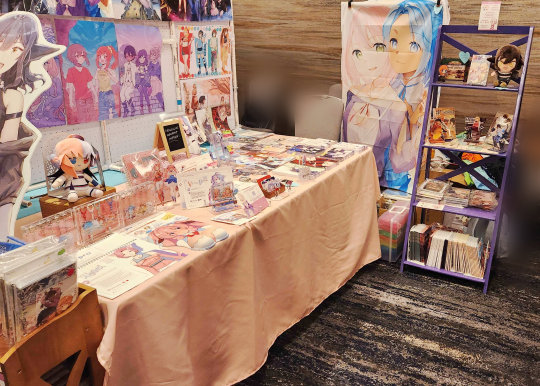
this table held our limited VirPro merch. we were able to hang our Élan prints on the wall behind it thanks to our friends at Studio Nekomata allowing us to tape our prints to the backside of their display. we also had a Miho cutout, but she didn’t want to stand up this weekend…
However, it is important to note that Studio Élan is not a new studio. We’ve been around for years, have 15k followers on Twitter, and have several visual novels released. We’re not extremely well known, as we are within a niche within a niche, but we aren’t unknown either. Some people actually cosplayed our characters at the convention! It’s definitely possible some locals came to OffKai Expo just to see our booth & panel (we also held a panel on Saturday where we announced 2 new games).
Another thing to note is that we have a stock of merch from running an online store and having held Kickstarters before. Specifically, we have physical copies of almost all of our games as well as artbooks, soundtracks, clothing, and more. We had tons of keychains and 11×17 prints, sure, but we also sold a lot of merch that is much harder and more expensive to produce.
So, tl;dr, things we had going for us:
We are established developers with a following & released games
We have a sizeable amount of merch already made for our online store, including physical games & artbooks
We were boothing with our indie vtuber friend group and selling their merch on the side
But our main problem:
We were boothing at a vtuber convention, not an anime or gaming convention
Now, with all of that out of the way….
convention standards
First off, let’s look at some basic things you can expect while tabling at a convention. (for the purposes of being specific to visual novels, when I say “convention” I’m only referring to anime & gaming-adjacent conventions—OffKai falls under this as vtubers are both anime & gaming-adjacent)
At a convention, you will typically be selling in either the artist alley or the dealer’s room, which are both referred to as the vendor’s hall. For small conventions, these two may be the same area. The artist alley is typically for artists selling keychains, prints, and more. The dealers room is for vendors that sell larger merch or have more items to sell – this can include artists but also includes people selling imported items (such as anime figures) and companies.
Conventions have a set amount of hours that the events go on and the vendor’s hall is usually not open the entire time. These rooms will usually open in the morning, around 10AM or so, and allow vendors an extra hour for fixing things before opening every day. For OffKai, we had to stay at our booth for about 8~ hours every day, except for Sunday. Sundays are always the shortest days for 3-day conventions, as the convention will usually wrap up around dinner time (if not earlier).
Vendors get time the night before the convention starts (usually Thursday night, with most conventions I’m referencing being Friday-Sunday events) to set up their booths. It took us around 3 hours to fully set up our booth, with 4 of us working on it. Setting up your booth will go a lot smoother if you do a trial run before the convention.
Every convention I’ve tabled at or known a vendor at provides vendors with at least 1 table and a chair. More chairs are usually easy to get, you just need to ask staff before the vendors hall opens up.
tip 1 – bring a friend
Conventions provide tables and chairs, but they don’t provide helping hands! You’re probably going to need help unpacking and setting up the table, but you’ll definitely need to take breaks during the convention for the bathroom, food, and more. You can’t just ask staff to sit at your table and you can’t just hide everything while you’re gone. Bring a friend to help out!
If you have to go alone, make friends with the people boothing next to you and ask them to watch over your table if need be. Be sure to keep your money and payment processors with you if you ever have to step away. And bring snacks & water!
our merch
Like I said, at Élan we have typical merchandise for our visual novels like keychains and acrylic standees, but we also have physical copies of our games for PC & consoles, artbooks, soundtracks, and more.
We had these types of merch:
Acrylic & wooden items
Keychains
Standees
Pins
Print media
PC discs
Console discs & cartridges (Nintendo Switch, PlayStation 4 & 5)
Artbooks (game artbooks, limited edition anniversary artbooks)
Soundtrack discs
4×6 prints (CGs, key artworks)
11×17 prints (key artworks, exclusive convention artworks)
Clothing & fabric
T-shirts (4 designs, 1 color each)
Hoodie (new collaboration design, for all of our games)
Scarf (new collaboration design, for 1 of our games)
Fabric flags (key visuals)
Misc.
Grab bag (misc small items)
$5 bin (misc small items)
Pencil bag
Mousepad
Enamel pin
Plushie (limited Makeship leftovers)
Some of these were items we’d never sold before such as the hoodie, scarf, and 11×17 prints. Some of them were also much more of a hassle than others.

In terms of storage and cheapness to make, prints and stickers are by far the winners (we didn’t sell stickers at OffKai but plan to in the future). Prints are basically the best thing you can sell for production cost:profit, as a 4×6 print can cost you $0.20 but sell for $5+ and an 11×17 print can cost $0.60 and sell for $15-20.
On the other hand, t-shirts can be some of the most difficult merch to work with. They take up a lot of room (we had at least 2 boxes of just shirts/hoodies) and require you to have multiple different sizes. The plushies were great & easy to sell, but at the same time they cost a lot per unit and take up even more space than shirts.
The physical copies sold great, but the cost to produce & room to store them makes them unwieldy for most developers. I would recommend them over more bespoke merch like clothing, though—several people came to our booth, having never heard of our games, and left with a physical game. CD discs rather than DVD cases are much easier to store and can be handmade, although ours are manufactured.
tip 2 – be selective with what merch you make & bring
Unless you’re lucky enough to have a convention down the street from you, chances are you’re going to have to travel to the convention. That means packing everything up, possibly shipping it, etc…. You need to be picky with what you bring if you don’t have multiple cars to throw it all in.
My merch recommendations:
4×6 prints
Ours were $4-5
Dirt cheap to print, easy to store
Easy for people to buy because of the low price point and ease of carrying
Idea – these are so cheap to print, at the very least print some of your key visual & logo to hand out to people for free
Stickers (die-cut or sticker sheets)
Dirt cheap to print, easy to store
Easy for people to buy because of the low price point and ease of carrying
Idea – some conventions won’t allow you to hand out free stickers. For conventions that don’t, I would sell either singular die-cut stickers or sell them in packs
Keychains
Ours were $12-15
Cheap to print, not very hard to store
At this price point people want to have an attachment to the characters before buying
Idea – if your game is relatively unknown but you still want to print keychains, consider packaging them with something else like the game or a sampler CD of the demo / soundtrack
Physical CD disc games
Ours were $30
Not cheap to print, not very hard to store
People will buy copies of games they’ve never heard of because it’s an interesting item to own and seen as more value than a digital copy (even if physical is more expensive)
Idea – it doesn’t cost much to get a 50 pack of CDs, the cost comes from the packaging and time to make the entire thing. If you don’t have a finished game yet, consider printing your demo out on CDs in paper slips to hand out for free
our booth
Now that I’ve talked about basics for conventions and what merch we sold, what did our booth actually look like?

We didn’t have a pre-convention trial run, so we were essentially winging it. With all of the merch I outlined, could you believe we crammed all of the display copies on 1 table, 2 shelves, and 1 clothing rack?!
Our main focus was making sure each of our physical games were visible. After all, we were at a vtuber convention where most attendees didn’t know us, so we wanted to have a way to show off our games. We spent a lot of real estate on showing individual game copies and having brochures spread out.

tip 3 – have an idea of how you’re going to display things before the convention
We also brought several items to display merch. For keychains & pins, we had a simple corkboard leaning on a photo stand / easel. For acrylic standees, we had a clear nail polish stand. For physical copies, we had photo stands and bookends. For clothes, we had a small clothing rack. For physicals, we had 3 small bookcases. These were all extremely helpful, but they are added costs and more things to carry to the convention.
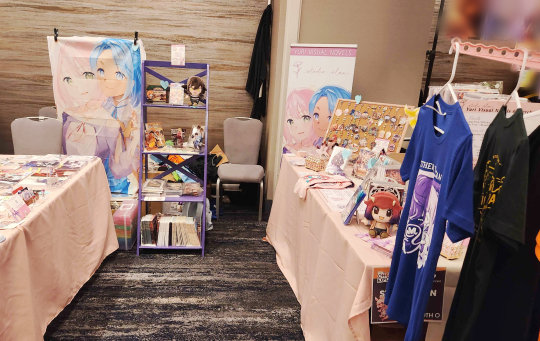

here’s a better look at our 2 bookshelves. the purple ladder one was at the back of the booth highlighting some items and storing various artbooks & bundles and the smaller one was at the front left of the booth by the VirPro merch, basically in the walking aisle
The corkboard and various photo stands were must-haves, regardless of what you’re selling. A corkboard makes it easy to display anything on it, whether it’s keychains, stickers, mini-prints, announcements, posters, and more. Photo stands were also super helpful for propping our corkboard on but also showing off individual physical copies.

this was me trying to arrange the corkboard and acrylic stands. photo stands and art easels can in handy!
Along with the display stands, we also brought some decorative items like pink table clothes and flowers. These aren’t required, but help make your booth more noticeable.
A few miscellaneous items I plan on bringing to our next convention are a hand sanitizer dispenser, a small air purifier, and fliers. I always keep hand sanitizer on me, but it’s easier to use it when it’s in a convenient bottle and place. Several of us got sick after the convention (despite me wearing a mask), so I’m also bringing a small air purifier to keep some germs away from the table. I also want to bring small fliers for our upcoming games—while brochures are wonderful, I want something that’s easy (and cheap) to hand out to anyone who looks at our booth, not just the people we talk to.
tip 4 – be aware of merch thieves
We arranged our table in a way that we didn’t have to worry much about people stealing merch, though that is a problem at some conventions. As you might’ve noticed from the pictures, our smaller items like the keychains are at the far back of the booth, right beside where we sit. That allowed us to keep a better eye on it.
Rather than sitting behind our tables, we arranged our booth to be where people would walk inside it. This allowed us a way to talk to people easier. We also made sure to hide our card readers, phones, and more when any of us left the table, though this was easy because we almost always had 2-3 people at the booth at any time.
my advice
If I were an indie dev looking to booth at a convention and had the time and spare change, I would if it were close enough to drive to and the booth cost under $500. Unless you’re an established developer or have a popular artist working on your project, it’s hard to justify that cost.
tip 5 – don’t forget to budget for…
booth costs
extra badges (most booths come with 2 free badges)
hotel
travel
food
merchandise manufacturing
any shipping fees (your luggage, merch, etc.)
display items, extra things for your booth
While you may find a booth for $250, you also have to remember the travel fees, cost of food, all of the extra items you’ll need aside from merchandise, and more. A $250 booth for a 3-day convention could easily end up costing you $2,000+, and that’s if you don’t pay yourself or coworkers for their time at the booth!
If you’ve never been to a convention before then definitely go to one as an attendee before becoming a vendor. Get a feel for the place and have some fun, even if it means you won’t be able to booth there for months or a year.
tip 6 – be sure to bring…
Some kind of handout for people with your game & logo on it (fliers, business cards, brochures, etc.)
Small stationary merch for your game (4×6 prints, stickers, etc.)
Corkboard to display things on and something to prop it up
A way to take card payments and cash for change
Hand sanitizer
Pen/pencil and sticky notes
Clamps
Tape

this is the inside of our old brochure! it details our different games and highlights some upcoming titles
I’d also try putting your demo on CDs to hand out to people who seem really interested if you can. CDs are pretty cheap to get now, and even if you just get a 50 pack that can run you around $12, which ends up being $0.25/CD. Not a bad cost for getting a potential fan, if you hand them out only to people who are really interested or package them with other merch and sell them.
Your main effort if you’re not an established developer, however, will be awareness. Talk to the people who stop by your booth. Tell them hi and explain to them what you make. I had several people clearly not understand what visual novels were, but I had many more who became interested once I mentioned we made these games. “Wait, you actually made them?!”
tip 7 – talk to people!!!
People at conventions think art is cool. They think indie games are cool. Be honest with them and show them your hard work. Yeah, this means you have to put on your extrovert cap for the weekend. Just don’t treat it like you’re a car salesman—you’re a game dev first and foremost and enjoy this line of work so much you want to share it with strangers at conventions. Let that shine through in your words.
All in all, conventions are stressful, tiring, and a lot of fun when they’re run well. If any of this sounds interesting to you and you find a convention close enough to you or one that will be relatively cheap to attend, I recommend trying it out.

------------
OffKai Expo was so, so much fun and I’m so happy I was able to attend. It was a well run convention, our booth did amazing, I got to meet actual fans IRL, and I was able to finally see a lot of my online friends in person. I was scared leading up to it but I’m so glad I pushed myself to go. Having an in-person panel there where the room was almost full absolutely blew me away—I kept asking “do they know what room they’re in? Did they get lost?” If you came to our panel or booth, thank you!!
— Arimia


read more of my articles on tumblr here!
50 notes
·
View notes
Text
tangentially animal-related hcs 4 the mean girls crew bc i am now responsible for giving a goldfish daddy issues
cady
inexplicably allergic to dogs and always in the first four stages of grief about it. don’t @ me about the medical semantics i just want her to suffer a little
tried to get a job at petco the second she turned eighteen but learned of the above information in the most destructive job interview since janis’s application to be the local coffee shop’s cool gay barista (they were worried that she’d swear at fighter-jet-takeoff volumes if she touched hot coffee) (she did, but only because they started playing a shitty pop cover of one of damian’s fave show tunes) and came out of the building a puddle of mucous and tears
grossly fascinated by the grossest of primitive functions. her insta page is all dope and authentic until you find a selfie taken using the back camera 0.5x with the corpse of an effervescent snail and a bunch of reels telling you how to narrow down what bird species are destroying your garden by the splay of their shit
has a miniature aneurysm whenever movies get stuff wrong about animals. artistic liberties are granted to janis alone. like sure if she’s in the theater she’ll sit through the movie fisting popcorn down her throat but as soon as she gets out of there the entire mall becomes a soapbox for dissecting the bullshit sexual dimorphism of giving female animals eyeliner
thus while i know the headcanon of her loving the lion king is basically canon i think she’s absurdly secretive about it. like she’s burying her merchandise and blu-ray copies under her bed in the dead of night while secreting more sweat than should be possible. she could come out to her parents and elope to antarctica no problem but liking the lion king which implies that lighter manes = stronger lions is a death sentence
probably got banned from a bunch of zoos for interrupting field trips
janis
had one of those angel/wolf/dragon/whatever hybrid phases as a kid like all good artists. did those like. not quite furry but not quite human animal art commissions on twitter for a while for the funnies but discovered a lucrative market and never turned back
does not know how to hold human or animal babies. like she’s good at taking care of them in terms of general physical and intellectual nourishment but that limp wrist is not supporting any necks properly
mercilessly makes fun of the whole “would you love me if i was a worm” trend. she doesn’t even love most humans what makes you think she has any answer for you regarding that other than that she’d turn you into a super deep art piece museums would purchase for exorbitant amounts
that being said she feels like a vivarium girlie to me. she’s nocturnal like a pillbug and post-canon constantly tries to convince the plastics that her pacman frog is poisonous
feeds her meticulously decorated ant farm gourmet meals every day. anyone else gets microwavable mac and cheese at best
this one probably won’t make sense unless you’re a jenny nicholson fan but she has a fake id for buying wine and turning the corks into those hallmark craft animal sculptures (and selling the open wine bottle to mrs george in back alleys)
damian
his grandma owns the most omnicidal chihuahua in the state of chicago. it’s how he learned to dance with such mental and physical dexterity. how else would he have survived visits to the nursing home
^ attempted to adopt the chihuahua’s children to have his own bruiser woods moment. turns out, even with his classically trained tenor voice, puppies and janis respond to the “drop it” command much the same way. that is to say they do not drop it and the puppies ran away with ninety nine per cent of his anastasia-inspired music box memorabilia
has a love-hate relationship with cats the musical. like memory is one of his top ten karaoke songs but he’s not going to admit it until he’s several fruity seltzers into the night. wishes all the actors in the movie had been replaced with real cats picked off the street before anything else was approved
played milky white in a scammy local production of into the woods and so so so embarrassed about it. he had to be on stilts the whole show
stuck a fish in regina’s backpack sometime in sophomore year but found karen feeding it and talking to it about her worst fears and greatest dreams felt too guilty to continue with the next phase of his plan (sticking a very hot picture of janis in regina’s backpack) (karen probably would’ve tried to talk to the photo too)
regina
musical specific but i think she didn’t Exactly do a matching animal costume with gretch and karen because 1) what can you dress up as when your friends are going as a cat and a mouse. cheese? 2) had cady not moved into the neighborhood, she’d have gone as a sexy lion to ease into the prospect of. you know. with shane oman but going as a sexy lion when your shiny new homoerotic frenemy has a lion pin on half her clothing isn’t quite a non-questionable choice
had a warrior cats phase she keeps under lock and key in the very depths of her closet. her closet is an iceberg of issues that goes shein -> homosexuality -> warrior cats and climate change is doing a number on it
fried a couple of janis’s ants alive with a magnifying glass sometime before middle school. she’s never flirted normally in her life
the bulk of janis’s furry commission clientele. she has so many emails for alternate accounts that she could get every american president ever suspended from twitter if national security let her. that’s including the dead ones
remember the nigh-rabid chihuahuas damian had. yeah she’s been raising those in secret for a few years now. mrs george doesn’t notice because regina hides them in her hair and extensions are, like, totally in or whatever
had a horse girl phase. all her drawings of horses came out like this meme tho. the art freaks nickname was born out of jealousy
gretchen
chose to be a sexy cat for halloween to match with karen because she has no sense of identity. also because she remembers regina’s warrior cats phase
actually a guinea pig person. i’ve never met a guinea pig person but she feels like one. they’re both in dire need of daily interaction and likely polyamorous
but also peri-canon gretchen could not keep a pet alive she’d spend every cent of the wieners fortune on buying the animal’s love
speaking of. her family bought a stable to fuel “her” horse girl phase. she just wanted to make regina happy and couldn’t stay on a saddle if there was an escalator that plopped her right on the horse
cares about the puppy bowl more than she cares about the superbowl
instinctively pets cute animals. if they bite her then she deserved it
karen
chose to be a sexy mouse for halloween because tom and jerry was having a media marathon and she’s into that sort of power dynamic
believes in unicorns more than she believes in horses. this is because she had a horse girl phase for the hottest of seconds before realizing that none of the ponies at the apache trail sale had horns and thought they had their horns cut off for aesthetic reasons
animals love her so much. survived a jellyfish attack because the jellyfish sensed she just wanted to pet something shiny and absolutely respected that. pests of all shapes and sizes evict themselves stat when karen says her mom doesn’t appreciate her hundred thousand dollar lotions being invaded by peril-bringing insects. strays follow her 24/7. gretchen is jealous (of the animals)
thinks tigers are very sick zebras
thinks blobfish are cuter when they’re all flesh putty out of their natural habitats but would also break into a zoo if she thought the animals were being mistreated
was banned from australia at the age of eight because she tried to have a sleepover in a kangaroo’s pouch
aaron
mean girls insta described him as a golden retriever so i’m also hcing him as being allergic to dogs <3 equality
becomes deeply fearful of all fauna after falling into a research rabbit hole for the sake of connecting with cady. what do you mean buffalo are some of the deadliest beasts on the planet and not just a type of chicken wing
kevin g
a preteen vsco girl in her granola advocacy era stuck in a teenage boy’s body. he has saved more turtles than any natucate volunteer by repurposing his rejected business cards to make a selfie stick long enough to stick him in the same selfie as gretchen wieners. the selfie stick has been in progress since daycare. he has also gone to the hospital more than any natucate volunteer do not trust this man with shop class equipment
#mean girls#cady heron#janis sarkisian#janis ‘imi’ike#damian hubbard#regina george#gretchen wieners#karen smith#karen shetty#aaron samuels#kevin gnapoor#kevin ganatri#these r so long for no reason#who wants goldfish pics btw
35 notes
·
View notes
Text
I've spoken about funerary food vendors, but I'm feeling chatty before I sleep, so what about the subject of paying them? Many kei will accept payment in food, being a ravenous and often overcrowded people, but that won't be the case for vendors who already have all they could eat.
That actually depends *entirely* on what you have to offer and what the individual wants. Kei have no standardized currency whatsoever! When going to markets, many kei will bring a wide assortment of trinkets, spices, art, and small but useful objects such as tools and knives. A lot of them will carry these items on their person, tied to their clothing. A lot of them also bring notebooks- if you have nothing physical to offer, some will accept your words instead, though this is more rare.
There are some kei, called scouters, who spend the vast majority of time seeking out any potentially interesting information, news, locations, or people, so they can trade hints of facts and names. These scouters are typically poor, but often deal with higher class clients who can afford to spend their material goods in return for good information. Especially reliable scouters might even make a long term deal to only gather intel for one individual who will in turn take care of their needs. For short term deals, clients may pay their scouters in material goods, or instead in trinkets and items that can easily be traded. There are even some kei who have based their careers on the ability to help non-scouters who have stumbled across good find the right person to tell in order to get what they need, though these kei will typically have this task as a side hustle.
Say you can't pay in food, trinkets, or information. Many kei will happily trade in labour. Do them a favor and they will give you whatever it was you aimed to buy in return. But the final option is slowly becoming more and more common: the precursor to a standardized currency, *rings*. These rings are made of metal, and they're often not worn on the fingers, but rather tied to clothing, hair, or jewelry. Paying a vendor in rings is not yet standardized and these rings are typically handmade and vastly varying in size and quality, but that's because you're not actually trading them like coins, though they're slowly approaching the point where they will be.
Instead, you're trading in metal to be used: you give rings to a vendor, and they can take those rings to ring banks that have ongoing deals. These ring banks will give that vendor whatever raw materials they need to continue making whatever they were making and selling, and those rings get melted down and traded to metalworkers for all sorts of things! Those metalworkers, in turn, will trade tools and other metal-made objects to the ring banks, who will trade them out to others in return for the raw materials they'd traded to the vendors. Those who receive the tools will of course use them until they can't be used, at which point they're either traded away as-is or melted down and made into rings to repeat the process.
Because this process isn't standardized, the value of the rings depends on what the vendor needs at the moment. The ring bank they work with might really want copper and have no use for gold. More versatile and useful materials usually vet you more, though. (Gold was a bad example, kei don't tend to think highly of it in general. Trade in copper, steel, and iron!)
8 notes
·
View notes
Text

Chapter VI. Fourth Period. — Monopoly
2. — The disasters in labor and the perversion of ideas caused by monopoly.
Like competition, monopoly implies a contradiction in its name and its definition. In fact, since consumption and production are identical things in society, and since selling is synonymous with buying, whoever says privilege of sale or exploitation necessarily says privilege of consumption and purchase: which ends in the denial of both. Hence a prohibition of consumption as well as of production laid by monopoly upon the wage-receivers. Competition was civil war, monopoly is the massacre of the prisoners.
These various propositions are supported by all sorts of evidence, — physical, algebraic, and metaphysical. What I shall add will be only the amplified exposition: their simple announcement demonstrates them.
Every society considered in its economic relations naturally divides itself into capitalists and laborers, employers and wage-receivers, distributed upon a scale whose degrees mark the income of each, whether this income be composed of wages, profit, interest, rent, or dividends.
From this hierarchical distribution of persons and incomes it follows that Say’s principle just referred to: In a nation the net product is equal to the gross product, is no longer true, since, in consequence of monopoly, the selling price is much higher than the cost price. Now, as it is the cost price nevertheless which must pay the selling price, since a nation really has no market but itself, it follows that exchange, and consequently circulation and life, are impossible.
In France, twenty millions of laborers, engaged in all the branches of science, art, and industry, produce everything which is useful to man. Their aggregate annual wages amount, it is estimated, to twenty thousand millions; but, in consequence of the profit (net product and interest) accruing to monopolists, twenty-five thousand millions must be paid for their products. Now, as the nation has no other buyers than its wage-receivers and wage-payers, and as the latter do not pay for the former, and as the selling-price of merchandise is the same for all, it is clear that, to make circulation possible, the laborer would have to pay five for that for which he has received but four. — What is Property: Chapter IV. [17]
This, then, is the reason why wealth and poverty are correlative, inseparable, not only in idea, but in fact; this is the reason why they exist concurrently; this is what justifies the pretension of the wage-receiver that the rich man possesses no more than the poor man, except that of which the latter has been defrauded. After the monopolist has drawn up his account of cost, profit, and interest, the wage-paid consumer draws up his; and he finds that, though promised wages stated in the contract as one hundred, he has really been given but seventy-five. Monopoly, therefore, puts the wage-receivers into bankruptcy, and it is strictly true that it lives upon the spoils.
Six years ago I brought out this frightful contradiction: why has it not been thundered through the press? Why have no teachers of renown warned public opinion? Why have not those who demand political rights for the workingman proclaimed that he is robbed? Why have the economists kept silent? Why?
Our revolutionary democracy is so noisy only because it fears revolutions: but, by ignoring the danger which it dares not look in the face, it succeeds only in increasing it. “We resemble,” says M. Blanqui, “firemen who increase the quantity of steam at the same time that they place weights on the safety-valve.” Victims of monopoly, console yourselves! If your tormentors will not listen, it is because Providence has resolved to strike them: Non audierunt, says the Bible, quia Deus volebat occidere eos.
Sale being unable to fulfil the conditions of monopoly, merchandise accumulates; labor has produced in a year what its wages will not allow it to consume in less than fifteen months: hence it must remain idle one-fourth of the year. But, if it remains idle, it earns nothing: how will it ever buy? And if the monopolist cannot get rid of his products, how will his enterprise endure? Logical impossibility multiplies around the workshop; the facts which translate it are everywhere.
“The hosiers of England,” says Eugene Buret, “had come to the point where they did not eat oftener than every other day. This state of things lasted eighteen months.” And he cites a multitude of similar cases.
But the distressing feature in the spectacle of monopoly’s effects is the sight of the unfortunate workingmen blaming each other for their misery and imagining that by uniting and supporting each other they will prevent the reduction of wages.
“The Irish,” says an observer, “have given a disastrous lesson to the working classes of Great Britain..... They have taught our laborers the fatal secret of confining their needs to the maintenance of animal life alone, and of contenting themselves, like savages, with the minimum of the means of subsistence sufficient to prolong life..... Instructed by this fatal example, yielding partly to necessity, the working classes have lost that laudable pride which led them to furnish their houses properly and to multiply about them the decent conveniences which contribute to happiness.”
I have never read anything more afflicting and more stupid. And what would you have these workingmen do? The Irish came: should they have been massacred? Wages were reduced: should death have been accepted in their stead? Necessity commanded, as you say yourselves. Then followed the interminable hours, disease, deformity, degradation, debasement, and all the signs of industrial slavery: all these calamities are born of monopoly and its sad predecessors, — competition, machinery, and the division of labor: and you blame the Irish!
At other times the workingmen blame their luck, and exhort themselves to patience: this is the counterpart of the thanks which they address to Providence, when labor is abundant and wages are sufficient.
I find in an article published by M. Leon Faucher, in the “Journal des Economistes” (September, 1845), that the English workingmen lost some time ago the habit of combining, which is surely a progressive step on which they are only to be congratulated, but that this improvement in the morale of the workingmen is due especially to their economic instruction.
“It is not upon the manufacturers,” cried a spinner at the meeting in Bolton, “that wages depend. In periods of depression the employers, so to speak, are only the lash with which necessity is armed; and whether they will or no, they have to strike. The regulative principle is the relation of supply to demand; and the employers have not this power.... Let us act prudently, then; let us learn to be resigned to bad luck and to make the most of good luck: by seconding the progress of our industry, we shall be useful not only to ourselves, but to the entire country.” [Applause.]
Very good: well-trained, model workmen, these! What men these spinners must be that they should submit without complaint to the lash of necessity, because the regulative principle of wages is supply and demand! M. Leon Faucher adds with a charming simplicity:
English workingmen are fearless reasoners. Give them a false principle, and they will push it mathematically to absurdity, without stopping or getting frightened, as if they were marching to the triumph of the truth.
For my part, I hope that, in spite of all the efforts of economic propagandism, French workingmen will never become reasoners of such power. Supply and demand, as well as the lash of necessity, has no longer any hold upon their minds. This was the one misery that England lacked: it will not cross the channel.
By the combined effect of division, machinery, net product, and interest, monopoly extends its conquests in an increasing progression; its developments embrace agriculture as well as commerce and industry, and all sorts of products. Everybody knows the phrase of Pliny upon the landed monopoly which determined the fall of Italy, latifundia perdidere Italiam. It is this same monopoly which still impoverishes and renders uninhabitable the Roman Campagna and which forms the vicious circle in which England moves convulsively; it is this monopoly which, established by violence after a war of races, produces all the evils of Ireland, and causes so many trials to O’Connell, powerless, with all his eloquence, to lead his repealers through this labyrinth. Grand sentiments and rhetoric are the worst remedy for social evils: it would be easier for O’Connell to transport Ireland and the Irish from the North Sea to the Australian Ocean than to overthrow with the breath of his harangues the monopoly which holds them in its grasp. General communions and sermons will do no more: if the religious sentiment still alone maintains the morale of the Irish people, it is high time that a little of that profane science, so much disdained by the Church, should come to the aid of the lambs which its crook no longer protects.
The invasion of commerce and industry by monopoly is too well known to make it necessary that I should gather proofs: moreover, of what use is it to argue so much when results speak so loudly? E. Buret’s description of the misery of the working-classes has something fantastic about it, which oppresses and frightens you. There are scenes in which the imagination refuses to believe, in spite of certificates and official reports. Couples all naked, hidden in the back of an unfurnished alcove, with their naked children; entire populations which no longer go to church on Sunday, because they are naked; bodies kept a week before they are buried, because the deceased has left neither a shroud in which to lay him out nor the wherewithal to pay for the coffin and the undertaker (and the bishop enjoys an income of from four to five hundred thousand francs); families heaped up over sewers, living in rooms occupied by pigs, and beginning to rot while yet alive, or dwelling in holes, like Albinoes; octogenarians sleeping naked on bare boards; and the virgin and the prostitute expiring in the same nudity: everywhere despair, consumption, hunger, hunger!.. And this people, which expiates the crimes of its masters, does not rebel! No, by the flames of Nemesis! when a people has no vengeance left, there is no longer any Providence for it.
Exterminations en masse by monopoly have not yet found their poets. Our rhymers, strangers to the things of this world, without bowels for the proletaire, continue to breathe to the moon their melancholy delights. What a subject for meditations, nevertheless, is the miseries engendered by monopoly!
It is Walter Scott who says:
Formerly, though many years since, each villager had his cow and his pig, and his yard around his house. Where a single farmer cultivates today, thirty small farmers lived formerly; so that for one individual, himself alone richer, it is true, than the thirty farmers of old times, there are now twenty-nine wretched day-laborers, without employment for their minds and arms, and whose number is too large by half. The only useful function which they fulfil is to pay, when they can, a rent of sixty shillings a year for the huts in which they dwell. [18]
A modern ballad, quoted by E. Buret, sings the solitude of monopoly:
Le rouet est silencieux dans la vallee: C’en est fait des sentiments de famille. Sur un peu de fumee le vieil aieul Etend ses mains pales; et le foyer vide Est aussi desole que son coeur. [19]
The reports made to parliament rival the novelist and the poet:
The inhabitants of Glensheil, in the neighborhood of the valley of Dundee, were formerly distinguished from all their neighbors by the superiority of their physical qualities. The men were of high stature, robust, active, and courageous; the women comely and graceful. Both sexes possessed an extraordinary taste for poetry and music. Now, alas! a long experience of poverty, prolonged privation of sufficient food and suitable clothing, have profoundly deteriorated this race, once so remarkably fine.
This is a notable instance of the inevitable degradation pointed out by us in the two chapters on division of labor and machinery. And our litterateurs busy themselves with the pretty things of the past, as if the present were not adequate to their genius! The first among them to venture on these infernal paths has created a scandal in the coterie! Cowardly parasites, vile venders of prose and verse, all worthy of the wages of Marsyas! Oh! if your punishment were to last as long as my contempt, you would be forced to believe in the eternity of hell.
Monopoly, which just now seemed to us so well founded in justice, is the more unjust because it not only makes wages illusory, but deceives the workman in the very valuation of his wages by assuming in relation to him a false title, a false capacity.
M. de Sismondi, in his “Studies of Social Economy,” observes somewhere that, when a banker delivers to a merchant bank-notes in exchange for his values, far from giving credit to the merchant, he receives it, on the contrary, from him.
“This credit,” adds M. de Sismondi, “is in truth so short that the merchant scarcely takes the trouble to inquire whether the banker is worthy, especially as the former asks credit instead of granting it.”
So, according to M. de Sismondi, in the issue of bank paper, the functions of the merchant and the banker are inverted: the first is the creditor, and the second is the credited.
Something similar takes place between the monopolist and wage-receiver.
In fact, the workers, like the merchant at the bank, ask to have their labor discounted; in right, the contractor ought to furnish them bonds and security. I will explain myself.
In any exploitation, no matter of what sort, the contractor cannot legitimately claim, in addition to his own personal labor, anything but the IDEA: as for the EXECUTION, the result of the cooperation of numerous laborers, that is an effect of collective power, with which the authors, as free in their action as the chief, can produce nothing which should go to him gratuitously. Now, the question is to ascertain whether the amount of individual wages paid by the contractor is equivalent to the collective effect of which I speak: for, were it otherwise, Say’s axiom, Every product is worth what it costs, would be violated.
“The capitalist,” they say, “has paid the laborers their daily wages at a rate agreed upon; consequently he owes them nothing.” To be accurate, it must be said that he has paid as many times one day’s wage as he has employed laborers, — which is not at all the same thing. For he has paid nothing for that immense power which results from the union of laborers and the convergence and harmony of their efforts; that saving of expense, secured by their formation into a workshop; that multiplication of product, foreseen, it is true, by the capitalist, but realized by free forces. Two hundred grenadiers, working under the direction of an engineer, stood the obelisk upon its base in a few hours; do you think that one man could have accomplished the same task in two hundred days? Nevertheless, on the books of the capitalist, the amount of wages is the same in both cases, because he allots to himself the benefit of the collective power. Now, of two things one: either this is usurpation on his part, or it is error. -What is Property: Chapter III.
To properly exploit the mule-jenny, engineers, builders, clerks, brigades of workingmen and workingwomen of all sorts, have been needed. In the name of their liberty, of their security, of their future, and of the future of their children, these workmen, on engaging to work in the mill, had to make reserves; where are the letters of credit which they have delivered to the employers? Where are the guarantees which they have received? What! millions of men have sold their arms and parted with their liberty without knowing the import of the contract; they have engaged themselves upon the promise of continuous work and adequate reward; they have executed with their hands what the thought of the employers had conceived; they have become, by this collaboration, associates in the enterprise: and when monopoly, unable or unwilling to make further exchanges, suspends its manufacture and leaves these millions of laborers without bread, they are told to be resigned! By the new processes they have lost nine days of their labor out of ten; and for reward they are pointed to the lash of necessity flourished over them! Then, if they refuse to work for lower wages, they are shown that they punish themselves. If they accept the rate offered them, they lose that noble pride, that taste for decent conveniences which constitute the happiness and dignity of the workingman and entitle him to the sympathies of the rich. If they combine to secure an increase of wages, they are thrown into prison! Whereas they ought to prosecute their exploiters in the courts, on them the courts will avenge the violations of liberty of commerce! Victims of monopoly, they will suffer the penalty due to the monopolists! O justice of men, stupid courtesan, how long, under your goddess’s tinsel, will you drink the blood of the slaughtered proletaire?
Monopoly has invaded everything, — land, labor, and the instruments of labor, products and the distribution of pro ducts. Political economy itself has not been able to avoid admitting it.
“You almost always find across your path,” says M. Rossi, “some monopoly. There is scarcely a product that can be regarded as the pure and simple result of labor; accordingly the economic law which proportions price to cost of production is never completely realized. It is a formula which is profoundly modified by the intervention of one or another of the monopolies to which the instruments of production are subordinated. — Course in Political Economy: Volume I., page 143.
M. Rossi holds too high an office to give his language all the precision and exactness which science requires when monopoly is in question. What he so complacently calls a modification of economic formulas is but a long and odious violation of the fundamental laws of labor and exchange. It is in consequence of monopoly that in society, net product being figured over and above gross product, the collective laborer must repurchase his own product at a price higher than that which this product costs him, — which is contradictory and impossible; that the natural balance between production and consumption is destroyed; that the laborer is deceived not only in his settlements, but also as to the amount of his wages; that in his case progress in comfort is changed into an incessant progress in misery: it is by monopoly, in short, that all notions of commutative justice are perverted, and that social economy, instead of the positive science that it is, becomes a veritable utopia.
This disguise of political economy under the influence of monopoly is a fact so remarkable in the history of social ideas that we must not neglect to cite a few instances.
Thus, from the standpoint of monopoly, value is no longer that synthetic conception which serves to express the relation of a special object of utility to the sum total of wealth: monopoly estimating things, not in their relation to society, but in their relation to itself, value loses its social character, and is nothing but a vague, arbitrary, egoistic, and essentially variable thing. Starting with this principle, the monopolist extends the term product to cover all sorts of servitude, and applies the idea of capital to all the frivolous and shameful industries which his passions and vices exploit. The charms of a courtesan, says Say, are so much capital, of which the product follows the general law of values, — namely, supply and demand. Most of the works on political economy are full of such applications. But as prostitution and the state of dependence from which it emanates are condemned by morality, M. Rossi will bid us observe the further fact that political economy, after having modified its formula in consequence of the intervention of monopoly, will have to submit to a new corrective, although its conclusions are in themselves irreproachable. For, he says, political economy has nothing in common with morality: it is for us to accept it, to modify or correct its formulas, whenever our welfare, that of society, and the interests of morality call for it. How many things there are between political economy and truth!
Likewise, the theory of net product, so highly social, progressive, and conservative, has been individualized, if I may say so, by monopoly, and the principle which ought to secure society’s welfare causes its ruin. The monopolist, always striving for the greatest possible net product, no longer acts as a member of society and in the interest of society; he acts with a view to his exclusive interest, whether this interest be contrary to the social interest or not. This change of perspective is the cause to which M. de Sismondi attributes the depopulation of the Roman Campagna. From the comparative researches which he has made regarding the product of the agro romano when in a state of cultivation and its product when left as pasture-land, he has found that the gross product would be twelve times larger in the former case than in the latter; but, as cultivation demands relatively a greater number of hands, he has discovered also that in the former case the net product would be less. This calculation, which did not escape the proprietors, sufficed to confirm them in the habit of leaving their lands uncultivated, and hence the Roman Campagna is uninhabited.
“All parts of the Roman States,” adds M. de Sismondi, “present the same contrast between the memories of their prosperity in the Middle Ages and their present desolation. The town of Ceres, made famous by Renzo da Ceri, who defended by turns Marseilles against Charles V. and Geneva against the Duke of Savoy, is nothing but a solitude. In all the fiefs of the Orsinis and the Colonnes not a soul. From the forests which surround the pretty Lake of Vico the human race has disappeared; and the soldiers with whom the formidable prefect of Vico made Rome tremble so often in the fourteenth century have left no descendants. Castro and Ronciglione are desolated.” — Studies in Political Economy.
In fact, society seeks the greatest possible gross product, and consequently the greatest possible population, because with it gross product and net product are identical. Monopoly, on the contrary, aims steadily at the greatest net product, even though able to obtain it only at the price of the extermination of the human race.
Under this same influence of monopoly, interest on capital, perverted in its idea, has become in turn a principle of death to society. As we have explained it, interest on capital is, on the one hand, the form under which the laborer enjoys his net product, while utilizing it in new creations; on the other, this interest is the material bond of solidarity between producers, viewed from the standpoint of the increase of wealth. Under the first aspect, the aggregate interest paid can never exceed the amount of the capital itself; under the second, interest allows, in addition to reimbursement, a premium as a reward of service rendered. In no case does it imply perpetuity.
But monopoly, confounding the idea of capital, which is attributable only to the creations of human industry, with that of the exploitable material which nature has given us, and which belongs to all, and favored moreover in its usurpation by the anarchical condition of a society in which possession can exist only on condition of being exclusive, sovereign, and perpetual, — monopoly has imagined and laid it down as a principle that capital, like land, animals, and plants, had in itself an activity of its own, which relieved the capitalist of the necessity of contributing anything else to exchange and of taking any part in the labors of the workshop. From this false idea of monopoly has come the Greek name of usury, tokos, as much as to say the child or the increase of capital, which caused Aristotle to perpetrate this witticism: coins beget no children. But the metaphor of the usurers has prevailed over the joke of the Stagyrite; usury, like rent, of which it is an imitation, has been declared a perpetual right; and only very lately, by a half-return to the principle, has it reproduced the idea of redemption.
Such is the meaning of the enigma which has caused so many scandals among theologians and legists, and regarding which the Christian Church has blundered twice, — first, in condemning every sort of interest, and, second, in taking the side of the economists and thus contradicting its old maxims. Usury, or the right of increase, is at once the expression and the condemnation of monopoly; it is the spoliation of labor by organized and legalized capital; of all the economic subversions it is that which most loudly accuses the old society, and whose scandalous persistence would justify an unceremonious and uncompensated dispossession of the entire capitalistic class.
Finally, monopoly, by a sort of instinct of self-preservation, has perverted even the idea of association, as something that might infringe upon it, or, to speak more accurately, has not permitted its birth.
Who could hope today to define what association among men should be? The law distinguishes two species and four varieties of civil societies, and as many commercial societies, from the simple partnership to the joint-stock company. I have read the most respectable commentaries that have been written upon all these forms of association, and I declare that I have found in them but one application of the routine practices of monopoly between two or more partners who unite their capital and their efforts against everything that produces and consumes, that invents and exchanges, that lives and dies. The sine qua non of all these societies is capital, whose presence alone constitutes them and gives them a basis; their object is monopoly, — that is, the exclusion of all other laborers and capitalists, and consequently the negation of social universality so far as persons are concerned.
Thus, according to the definition of the statute, a commercial society which should lay down as a principle the right of any stranger to become a member upon his simple request, and to straightway enjoy the rights and prerogatives of associates and even managers, would no longer be a society; the courts would officially pronounce its dissolution, its nonexistence. So, again, articles of association in which the contracting parties should stipulate no contribution of capital, but, while reserving to each the express right to compete with all, should confine themselves to a reciprocal guarantee of labor and wages, saying nothing of the branch of exploitation, or of capital, or of interest, or of profit and loss, — such articles would seem contradictory in their tenor, as destitute of purpose as of reason, and would be annulled by the judge on the complaint of the first rebellious associate. Covenants thus drawn up could give rise to no judicial action; people calling themselves the associates of everybody would be considered associates of nobody; treatises contemplating guarantee and competition between associates at the same time, without any mention of social capital and without any designation of purpose, would pass for a work of transcendental charlatanism, whose author could readily be sent to a madhouse, provided the magistrates would consent to regard him as only a lunatic.
And yet it is proved, by the most authentic testimony which history and social economy furnish, that humanity has been thrown naked and without capital upon the earth which it cultivates; consequently that it has created and is daily creating all the wealth that exists; that monopoly is only a relative view serving to designate the grade of the laborer, with certain conditions of enjoyment; and that all progress consists, while indefinitely multiplying products, in determining their proportionality, — that is, in organizing labor and comfort by division, machinery, the workshop, education, and competition. On the other hand, it is evident that all the tendencies of humanity, both in its politics and in its civil laws, are towards universalization, — that is, towards a complete transformation of the idea of society as determined by our statutes.
Whence I conclude that articles of association which should regulate, no longer the contribution of the associates, — since each associate, according to the economic theory, is supposed to possess absolutely nothing upon his entrance into society, — but the conditions of labor and exchange, and which should allow access to all who might present themselves, — I conclude, I say, that such articles of association would contain nothing that was not rational and scientific, since they would be the very expression of progress, the organic formula of labor, and since they would reveal, so to speak, humanity to itself by giving it the rudiment of its constitution.
Now, who, among the jurisconsults and economists, has ever approached even within a thousand leagues of this magnificent and yet so simple idea?
“I do not think,” says M. Troplong, “that the spirit of association is called to greater destinies than those which it has accomplished in the past and up to the present time... ; and I confess that I have made no attempt to realize such hopes, which I believe exaggerated.... There are well-defined limits which association should not overstep. No! association is not called upon in France to govern everything. The spontaneous impulse of the individual mind is also a living force in our nation and a cause of its originality....
“The idea of association is not new.... Even among the Romans we see the commercial society appear with all its paraphernalia of monopolies, corners, collusions, combinations, piracy, and venality.... The joint-stock company realizes the civil, commercial, and maritime law of the Middle Ages: at that epoch it was the most active instrument of labor organized in society.... From the middle of the fourteenth century we see societies form by stock subscriptions; and up to the time of Law’s discomfiture, we see their number continually increase.... What! we marvel at the mines, factories, patents, and newspapers owned by stock companies! But two centuries ago such companies owned islands, kingdoms, almost an entire hemisphere. We proclaim it a miracle that hundreds of stock subscribers should group themselves around an enterprise; but as long ago as the fourteenth century the entire city of Florence was in similar silent partnership with a few merchants, who pushed the genius of enterprise as far as possible. Then, if our speculations are bad, if we have been rash, imprudent, or credulous, we torment the legislator with our cavilling complaints; we call upon him for prohibitions and nullifications. In our mania for regulating everything, even that which is already codified; for enchaining everything by texts reviewed, corrected, and added to; for administering everything, even the chances and reverses of commerce, — we cry out, in the midst of so many existing laws: ‘There is still something to do!’”
M. Troplong believes in Providence, but surely he is not its man. He will not discover the formula of association clamored for today by minds disgusted with all the protocols of combination and rapine of which M. Troplong unrolls the picture in his commentary. M. Troplong gets impatient, and rightly, with those who wish to enchain everything in texts of laws; and he himself pretends to enchain the future in a series of fifty articles, in which the wisest mind could not discover a spark of economic science or a shadow of philosophy. In our mania, he cries, for regulating everything, EVEN THAT WHICH IS ALREADY CODIFIED!.... I know nothing more delicious than this stroke, which paints at once the jurisconsult and the economist. After the Code Napoleon, take away the ladder!...
“Fortunately,” M. Troplong continues, “all the projects of change so noisily brought to light in 1837 and 1838 are forgotten today. The conflict of propositions and the anarchy of reformatory opinions have led to negative results. At the same time that the reaction against speculators was effected, the common sense of the public did justice to the numerous official plans of organization, much inferior in wisdom to the existing law, much less in harmony with the usages of commerce, much less liberal, after 1830, than the conceptions of the imperial Council of State! Now order is restored in everything, and the commercial code has preserved its integrity, its excellent integrity. When commerce needs it, it finds, by the side of partnership, temporary partnership, and the joint-stock company, the free silent partnership, tempered only by the prudence of the silent partners and by the provisions of the penal code regarding swindling.” — Troplong: Civil and Commercial Societies: Preface.
What a philosophy is that which rejoices in the miscarriage of reformatory endeavors, and which counts its triumphs by the negative results of the spirit of inquiry! We cannot now enter upon a more fundamental criticism of the civil and commercial societies, which have furnished M. Troplong material for two volumes. We will reserve this subject for the time when, the theory of economic contradictions being finished, we shall have found in their general equation the programme of association, which we shall then publish in contrast with the practice and conceptions of our predecessors.
A word only as to silent partnership.
One might think at first blush that this form of joint-stock company, by its expansive power and by the facility for change which it offers, could be generalized in such a way as to take in an entire nation in all its commercial and industrial relations. But the most superficial examination of the constitution of this society demonstrates very quickly that the sort of enlargement of which it is susceptible, in the matter of the number of stockholders, has nothing in common with the extension of the social bond.
In the first place, like all other commercial societies, it is necessarily limited to a single branch of exploitation: in this respect it is exclusive of all industries foreign to that peculiarly its own. If it were otherwise, it would have changed its nature; it would be a new form of society, whose statutes would regulate, no longer the profits especially, but the distribution of labor and the conditions of exchange; it would be exactly such an association as M. Troplong denies and as the jurisprudence of monopoly excludes.
As for the personal composition of the company, it naturally divides itself into two categories, — the managers and the stockholders. The managers, very few in number, are chosen from the promoters, organizers, and patrons of the enterprise: in truth, they are the only associates. The stockholders, compared with this little government, which administers the society with full power, are a people of taxpayers who, strangers to each other, without influence and without responsibility, have nothing to do with the affair beyond their investments. They are lenders at a premium, not associates.
One can see from this how all the industries of the kingdom could be carried on by such companies, and each citizen, thanks to the facility for multiplying his shares, be interested in all or most of these companies without thereby improving his condition: it might happen even that it would be more and more compromised. For, once more, the stockholder is the beast of burden, the exploitable material of the company: not for him is this society formed. In order that association may be real, he who participates in it must do so, not as a gambler, but as an active factor; he must have a deliberative voice in the council; his name must be expressed or implied in the title of the society; everything regarding him, in short, should be regulated in accordance with equality. But these conditions are precisely those of the organization of labor, which is not taken into consideration by the code; they form the ULTERIOR object of political economy, and consequently are not to be taken for granted, but to be created, and, as such, are radically incompatible with monopoly. [20]
Socialism, in spite of its high-sounding name, has so far been no more fortunate than monopoly in the definition of society: we may even assert that, in all its plans of organization, it has steadily shown itself in this respect a plagiarist of political economy. M. Blanc, whom I have already quoted in discussing competition, and whom we have seen by turns as a partisan of the hierarchical principle, an officious defender of inequality, preaching communism, denying with a stroke of the pen the law of contradiction because he cannot conceive it, aiming above all at power as the final sanction of his system, — M. Blanc offers us again the curious example of a socialist copying political economy without suspecting it, and turning continually in the vicious circle of proprietary routine. M. Blanc really denies the sway of capital; he even denies that capital is equal to labor in production, in which he is in accord with healthy economic theories. But he can not or does not know how to dispense with capital; he takes capital for his point of departure; he appeals to the State for its silent partnership: that is, he gets down on his knees before the capitalists and recognizes the sovereignty of monopoly. Hence the singular contortions of his dialectics. I beg the reader’s pardon for these eternal personalities: but since socialism, as well as political economy, is personified in a certain number of writers, I cannot do otherwise than quote its authors.
“Has or has not capital,” said “La Phalange,” “in so far as it is a faculty in production, the legitimacy of the other productive faculties? If it is illegitimate, its pretensions to a share of the product are illegitimate; it must be excluded; it has no interest to receive: if, on the contrary, it is legitimate, it cannot be legitimately excluded from participation in the profits, in the increase which it has helped to create.”
The question could not be stated more clearly. M. Blanc holds, on the contrary, that it is stated in a very confused manner, which means that it embarrasses him greatly, and that he is much worried to find its meaning.
In the first place, he supposes that he is asked “whether it is equitable to allow the capitalist a share of the profits of production equal to the laborer’s.” To which M. Blanc answers unhesitatingly that that would be unjust. Then follows an outburst of eloquence to establish this injustice.
Now, the phalansterian does not ask whether the share of the capitalist should or should not be equal to the laborer’s; he wishes to know simply whether he is to have a share. And to this M. Blanc makes no reply.
Is it meant, continues M. Blanc, that capital is indispensable to production, like labor itself? Here M. Blanc distinguishes: he grants that capital is indispensable, as labor is, but not to the extent that labor is.
Once again, the phalansterian does not dispute as to quantity, but as to right.
Is it meant — it is still M. Blanc who interrogates — that all capitalists are not idlers? M. Blanc, generous to capitalists who work, asks why so large a share should be given to those who do not work? A flow of eloquence as to the impersonal services of the capitalist and the personal services of the laborer, terminated by an appeal to Providence.
For the third time, you are asked whether the participation of capital in profits is legitimate, since you admit that it is indispensable in production.
At last M. Blanc, who has understood all the time, decides to reply that, if he allows interest to capital, he does so only as a transitional measure and to ease the descent of the capitalists. For the rest, his project leading inevitably to the absorption of private capital in association, it would be folly and an abandonment of principle to do more. M. Blanc, if he had studied his subject, would have needed to say but a single phrase: “I deny capital.”
Thus M. Blanc, — and under his name I include the whole of socialism, — after having, by a first contradiction of the title of his book, “ORGANIZATION OF LABOR,” declared that capital was indispensable in production, and consequently that it should be organized and participate in profits like labor, by a second contradiction rejects capital from organization and refuses to recognize it: by a third contradiction he who laughs at decorations and titles of nobility distributes civic crowns, rewards, and distinctions to such litterateurs inventors, and artists as shall have deserved well of the country; he allows them salaries according to their grades and dignities; all of which is the restoration of capital as really, though not with the same mathematical precision, as interest and net product: by a fourth contradiction M. Blanc establishes this new aristocracy on the principle of equality, — that is, he pretends to vote masterships to equal and free associates, privileges of idleness to laborers, spoliation in short to the despoiled: by a fifth contradiction he rests this equalitarian aristocracy on the basis of a power endowed with great force, — that is, on despotism, another form of monopoly: by a sixth contradiction, after having, by his encouragements to labor and the arts, tried to proportion reward to service, like monopoly, and wages to capacity, like monopoly, he sets himself to eulogize life in common, labor and consumption in common, which does not prevent him from wishing to withdraw from the effects of common indifference, by means of national encouragements taken out of the common product, the grave and serious writers whom common readers do not care for: by a seventh contradiction.... but let us stop at seven, for we should not have finished at seventy-seven.
It is said that M. Blanc, who is now preparing a history of the French Revolution, has begun to seriously study political economy. The first fruit of this study will be, I do not doubt, a repudiation of his pamphlet on “Organization of Labor,” and consequently a change in all his ideas of authority and government. At this price the “History of the French Revolution,” by M. Blanc, will be a truly useful and original work.
All the socialistic sects, without exception, are possessed by the same prejudice; all, unconsciously, inspired by the economic contradiction, have to confess their powerlessness in presence of the necessity of capital; all are waiting, for the realization of their ideas, to hold power and money in their hands. The utopias of socialism in the matter of association make more prominent than ever the truth which we announced at the beginning: There is nothing in socialism which is not found in political economy; and this perpetual plagiarism is the irrevocable condemnation of both. Nowhere is to be seen the dawn of that mother-idea, which springs with so much eclat from the generation of the economic categories, — that the superior formula of association has nothing to do with capital, a matter for individual accounts, but must bear solely upon equilibrium of production, the conditions of exchange, the gradual reduction of cost, the one and only source of the increase of wealth. Instead of determining the relations of industry to industry, of laborer to laborer, of province to province, and of people to people, the socialists dream only of providing themselves with capital, always conceiving the problem of the solidarity of laborers as if it were a question of founding some new institution of monopoly. The world, humanity, capital, industry, business machinery, exist; it is a matter now simply of finding their philosophy, — in other words, of organizing them: and the socialists are in search of capital! Always outside of reality, is it astonishing that they miss it?
Thus M. Blanc asks for State aid and the establishment of national workshops; thus Fourier asked for six million francs, and his followers are still engaged today in collecting that sum; thus the communists place their hope in a revolution which shall give them authority and the treasury, and exhaust themselves in waiting for useless subscriptions. Capital and power, secondary organs in society, are always the gods whom socialism adores: if capital and power did not exist, it would invent them. Through its anxieties about power and capital, socialism has completely overlooked the meaning of its own protests: much more, it has not seen that, in involving itself, as it has done, in the economic routine, it has deprived itself of the very right to protest. It accuses society of antagonism, and through the same antago-nism it goes in pursuit of reform. It asks capital for the poor laborers, as if the misery of laborers did not come from the competition of capitalists as well as from the factitious opposition of labor and capital; as if the question were not today precisely what it was before the creation of capital, — that is, still and always a question of equilibrium; as if, in short, — let us repeat it incessantly, let us repeat it to satiety, — the question were henceforth of something other than a synthesis of all the principles brought to light by civilization, and as if, provided this synthesis, the idea which leads the world, were known, there would be any need of the intervention of capital and the State to make them evident.
Socialism, in deserting criticism to devote itself to decla-mation and utopia and in mingling with political and religious intrigues, has betrayed its mission and misunderstood the character of the century. The revolution of 1830 demoralized us; socialism is making us effeminate. Like political economy, whose contradictions it simply sifts again, socialism is powerless to satisfy the movement of minds: it is henceforth, in those whom it subjugates, only a new prejudice to destroy, and, in those who propagate it, a charlatanism to unmask, the more dangerous because almost always sincere.
#organization#revolution#anarchism#daily posts#communism#anti capitalist#anti capitalism#late stage capitalism#anarchy#anarchists#libraries#leftism#social issues#economy#economics#climate change#anarchy works#environmentalism#environment#solarpunk#anti colonialism#mutual aid#the system of economic contradictions#the philosophy of poverty#volume i#pierre-joseph proudhon#pierre joseph proudhon
19 notes
·
View notes
Text
Rook Headcannons: Family, life, etc.
Just cause I find him so funny
Edit: This got long! I wont apologize
You can pry the Bird Beastman Headcannon out of my cold dead hands.
I saw the idea that his siblings were named after chess peices, and I do love that but hear me out: Robin, Raven, Rook, Rosella, Ruff, Wren (hes the odd one)
Middle child energy- Rook may be a bit more extreme than his siblings, especially the older ones, but I feel like the whole family is on the same wavelength
The random mansions around the world with goverment approved portals? They are 100% black market associated. Probably animal trade or sell useful byproducts as potion ingredients. Scavengers, like the birds they are
Not ruling out some highly illegal/Immoral trades. But yeah.
Rook and each of his family may seem unassuming on their own, but when all of them are together? People can't get out of their way fast enough.
Uncanny Valley the whole lot of em. Give everyone goosebumps.
The Addams Family 100%
Probably also why you wouldn't hardly see them all together
Each sibling probably has/had a nanny and probably aren't too close with one another
Definitely "let kids roam" parents, as long as a kid showed up sometime, probably didn't care what they were up to
Rook 100% walked out of the house at 10yo with his bow and said he was off to hunt down a bear and parent Hunts were like "ok have fun! we'll taxidermy it when you get back"
One of the younger ones definitely does taxidermy
Rooks older sister knows every natural poison and even which ones can potentially be poisons when mixed with common household items!
Rook has been stabbed/trapped/poisoned by his siblings before
Hunt Parents are very much like morticia and gomez but worse parents in that they are less involved
Probably Not a lot of physical affection in the house
Dunno why, Rook just seems a bit touch starved
Probably also didn't hear much praise as a kid.
As such; Love language to give is words of affection, to receive is physical touch
Rook prior to Pomefiore smelled like blood. Just slightly mettalic tinge clingling to him constantly
Beastman in Savannaclaw gave him a WIDE berth.
Currently, smells like nothing, he doesn't wear the perfumes or scented products vil reccomends, much to vils dismay
Love the idea that vil gave him strong scented perfumes as a way to "bell the cat". Vil is mad it didn't work and is slowly getting less subtle about it, trying more and more obvious ways. Including changing the laundry detergent in the dorm to a strong scented one.
Rook is aware and finds it funny
Vil may say he tolerates Rook, but I think they were both lonely kids in a big new school and rely on each other.
Vil and Rook will probably be longtime friends if not lifelong friends. Vil heavily values having someone beside him who is unafraid to give him true, valid, critique and Vil has shown how much he values Rooks input. Rook admires Vils tenacity more than anything and will probably never leave him willingly.
They definitely fight though. Rook is a bit too callous when Vil needs a little soft and Vil is a bit too cutting when Rook could use a gentle hand and they get hurt. Will always make up, even if neither of them are good at apologizing
Or maybe one day years from now someone takes it a bit too far (probably rook) and they go a few years without talking
I can't imagine Rook in a profession besides whatever it is his parents do. Black market deals and trade probably. If someone asks he'll just say he is in Business
Rook will be a Parton of the Arts his whole life. sponsoring artists, probably from backgrounds like Neige. Will definitely be a very sketchy backer. No one will know what he does, but hes always throwing money around and who ever he finds, they will probably be the next big thing.
#disney twst#twisted wonderland#twst#twst wonderland#rook hunt#twst rook#vil schoenheit#rook hunt headcanons
46 notes
·
View notes
Text
In Israel, you’ll find a patchwork of different communities. Most Israeli Jews originate from Europe, North Africa and the Middle East, but some come from other regions, such as India.
According to the Indian Embassy in Tel Aviv, there are about 85,000 Jews of Indian origin in Israel — so Indian Jews make up just 1.2% of Israel’s Jewish population. This small community is divided into four groups: the Bene Israel from Maharashtra, the Cochin Jews from Kerala, the Baghdadi Jews from Kolkata, and the Bnei Menache from Mizoram and Manipur.
Although I grew up in the U.S., my mother’s family is from the Cochin Jewish community in Israel. I wanted to find out more about how this community is preserving our unique Jewish traditions from the South of India.
Many of these traditions are at a risk of dying out. For example, the language of the Cochin Jewish community is called Judeo-Malayalam. Today, this dialect has only a few dozen native speakers left (you can hear it spoken in this video).
According to legend, the first Jews arrived in Cochin during the time of King Solomon. The oldest physical evidence of their presence is a set of engraved copper plates dating from around 379-1000 CE, which were given to community leader Joseph Rabban by the Chera Perumal dynasty ruler of Kerala.
Jewish sailors originally arrived in Kodungallur (Cranganore), an ancient port city known as Shingly by Jews, before shifting to Cochin following a flood in 1341. These Jews became known as the Malabari Jewish community. After the expulsion of Jews from Spain in 1492, a group of Sephardic Jews also came to Cochin, and became known as the Paradesi (Foreign) Jews. The Malabari and Paradesi Jews historically lived separately and maintained their own traditions, although in modern times this division has become less important.
Today, the vast majority of Cochin Jews live in Israel. I spoke with several community members to learn about current projects in Israel to preserve Cochini Jewish culture.
Hadar Nehemya, a jazz musician and performer, runs a food delivery service sharing traditional Cochin Jewish recipes. Hadar learned the art of cooking from her mother, who learned it from her paternal grandmother.
Cooking her dishes from scratch and selling them at markets and for delivery, Hadar’s goal is to introduce Cochini cooking into the mainstream of Israeli culture. “Many Israelis don’t know much about Cochin Jewish culture. Maybe they met a Cochini person in the army,” she said. “But Indian food is popular in Israel, because Israelis love to visit India after they finish their army service.”
Cochin Jewish cuisine is similar to other types of South Indian cuisine, but also has influences from Iberian and Middle Eastern cooking. One example is pastel, pastries with a spicy filling that are similar to empanadas. Other staples include fish and egg curries, chicken stew, black-eyed pea stew, dosa (thin rice pancakes) and dishes cooked with coconut and mango.
Hadar’s favorite dishes to cook are idli and sambar, which are often eaten together. Idli is a type of savory rice cake, while sambar is a spiced lentil stew. Although Hadar says it’s difficult to maintain an Indian food business from an economic perspective, she’s passionate about cooking and enjoys creating homemade dishes with the right balance of spices.
Along with cooking, music is also important in Cochini culture. In most religious Jewish communities, women aren’t permitted to sing in front of men who aren’t their immediate relatives. However, this prohibition was not part of the Cochini tradition.
In the Cochin Jewish community, women have sung in Hebrew and Judeo-Malayalam for centuries. Piyyutim (liturgical poems) were sung in the synagogue or at people’s homes during holidays. Judeo-Malayalam folk songs were sung at weddings and special occasions, and the lyrics of these songs were recorded in notebooks to hand down to future generations. Later, many women also learned Zionist songs in preparation for moving to Israel. I have memories of my own grandmother singing these songs at home.
In recent years, audio recordings have been produced of Cochini songs, including a collection called “Mizmorim” (Psalms) featuring Hadar’s grandmother, Yekara Nehemya. Hadar then created her own version of one of the songs, “Yonati Ziv.”
Today, community leader Tova Aharon-Kastiel has organized a choir which meets once or twice a month at different locations. In the choir, Cochini and non-Cochini women, mostly aged 65-85, sing songs in Hebrew and Judeo-Malayalam. The older generation is eager for the younger generation to get involved, but since most younger Cochin Jews have a mixed background and are assimilated into mainstream Israeli culture, this is sometimes proving a challenge.
Still, many young Cochin Jews are eager to connect with their roots. The community maintains several Facebook groups, including one specifically geared towards the younger generation. The group description reads: “If you are a young Cochini, you surely know (at least partially) the wonderful heritage of our forefathers and mothers… the sad truth is that this heritage is currently on its way to pass from the world.”
Shlomo Gadot is the CEO of Inuitive, a semiconductor company, and is actively involved with Cochini community projects. His nephew, Ori, runs the Facebook group for the younger generation. Shlomo says events are regularly held at the Indian Embassy in Tel Aviv for young Cochinis. “Normally the embassy gives them their office in Tel Aviv, and they invite the young Cochini people to come there and do a trivia contest,” he said. “They do it twice a year, once at Hanukkah and once at Passover.”
According to Shlomo, the embassy also has initiatives to create connections between Indian and Israeli tech companies. “Sometimes they invite people to the ambassador’s house or office to see how they can create connections between Israeli and Indian companies,” he said. “They also have a program to bring young people to India to help them get to know India better.”
Anil Abraham is one of the few Cochin Jews with recent memories of life in India. Born in Jerusalem, his family returned to India when he was 8 years old, and he lived there until age 35 before migrating back to Israel. He says he found growing up Jewish in India difficult, but rewarding. “It was very difficult to move there from Israel and learn Malayalam,” he said. “But it was amazing to be part of the community and enjoy Cochini food prepared from scratch. We used to attend prayers in the Paradesi Synagogue, because right now there are fewer than 20 Jews in Kerala.”
Today, Anil runs tours of Kerala for the Cochin Jewish community and others. “The kids travel with their parents and grandparents to India,” he said. “That’s how our traditions are passed down.”
16 notes
·
View notes
Text

Seeing lots of discourse about the woman with a shelf full of NA erotica, and then the post saying she doesn't read, she just consumes porn, and then the backlash to that post. Imo both sides are right, there's just a communication gap.
There's always been a holier-than-thou sentiment about reading compared to other forms of media, which admittedly is fair when you compare it to like Youtube and Tiktok. But as mediums like those grow in popularity, so too does the reactionary stance of "reading good," and this has muddied what "reading" actually means. People conflate "reading" with just consuming the written word, like the act of looking at a page is itself a healthy thing to do. It's certainly healthier than other options, but this argument misunderstands the original conceit of "writing > other media." People who love literature don't love it because of the physical product of a book. They love it because books introduce them to another perspective, and stylized prose from that perspective (a book as a physical product is also nice, admittedly). Literature exists as an act of empathy from one lived experience to another, but the medium doesn't matter. It could be a movie or a show or a podcast. So then we get to the erotica argument.
There's nothing wrong with enjoying a book for whatever reason you want to enjoy it, just as you can enjoy any piece of art for whatever reason you'd like. But I think when you conflate books meant to be consumed (erotica) with books meant to be really thought over, you misunderstand why people have always "read" to begin with, what "reading" has always meant to people. So you have two groups of people:
1. People who have always read to try to refine their worldview and understand the people and cultures and etc. around them.
2. People who read books for pleasure's sake.
The best novels combine these in some ratio (though usually not with erotica, but erotica isn't incompatible with thoughtfulness). But both of these flags have been flown under the broad banner of "reading," even though each group is looking for different things in a book, which again, is totally fine. But you end up with increasingly polarizing, pretentious groups of people spouting about what a book should do, bragging about the titles they have or haven't read ("I've read/haven't read Infinite Jest" vs. "I have/haven't read The Love Hypothesis"), and just generally being annoying.
It's hard, because the verbiage isn't really there for good discourse. You can't really tell someone whose literary diet is 90% erotica that they don't read books like a literary scholar, because that triggers a knee-jerk reaction of "you can't tell me how to read," which, okay, fair, but let's be honest with ourselves. Your bookshelf is color coordinated, almost all of it is NA romance, and there's literal visual porn next to your books. These books are products more than they're art, which doesn't mean you can't read books for their empathetic value, just that you haven't for some of the books you've read. At the same time, if you tell a lit scholar that these are equally valid books, they'll turn their head up, because their definition of a book has always been synonymous with "thing that triggers deep personal inquiry," when in reality, what a "book" is is quite broad.
Again, read what you want, just know why you read and why other people read, and know that these are equally valid and fairly distinct aims, and that, because of this polarization, these aims are increasingly polarized by publishers so that their books sell well--the market churns out poorly written, soulless romance novels just as it churns out curmudgeonly Oscar bait novels at maybe the greatest frequency we've seen because people like picking one of those sides and snapping at the other.
TLDR: At the end of the day, we just can't equate Colleen Hoover and Kurt Vonnegut, and that's okay. Source: I write "serious fiction" and also (admittedly not smutty) McDonalds fanfic
11 notes
·
View notes
Text
Dream Animated Movie Musical Tournament Semifinal Round Match 1
And so we're at the semifinals with four musicals remaining, poetically two more dramatic ones going up against a comedy each and I wish I could say I was surprised that three out of four are the kind of alt that would make Hot Topic jump at the chance to merch the heck out of them (it just depends on if they've changed their art-thieving ways if the teens/young adults take the bait)
Beetlejuice
Why this deserves to be an animated movie musical: its musical deserves a movie (even if that means you'd have to rewrite half of "The Whole Being Dead Thing" for fourth-wall-breaking to a movie audience instead of a stage audience but that just helps it be distinct) and animation would help distinguish it from the existing movies as well as just be able to really amp things up visually from what you can depict on stage (imho movie adaptations of fantasy or sci-fi musicals should always be animated unless you're using a majority of practical effects instead of so much CGI a live-action movie of them might as well be animated)
Ideal animation style (at least imho): Laika Studios's style but I'm not just saying that because of Coraline, I just feel like that visual style would kinda "match its freak" if you get what I mean and we haven't really seen that style with a musical yet
Additional notes: as I said last round I do have a partial dream-voice-cast but I'm completely freaking stuck on who should voice Beetlejuice as I feel like Alex Brightman isn't a big enough name outside certain circles for him returning to be worth it unless everyone else was a big enough name to sell tickets and a lot of the more-mainstream actors I think would work are almost-there-but-not-quite (e.g. while I may love dream-voice-casting NPH as trickster figures I feel like he doesn't have enough edge to pull off Beetlejuice)
Jekyll & Hyde
Why this deserves to be an animated movie musical: it'd be a lot easier on the actor playing the title dual role if they only had to play it vocally and not physically and also the gothic vibes and the setting could translate really cool. Also this is a classic story that tends to get overshadowed a lot by its other spooky contemporaries
Ideal animation style (at least imho): something with the darkness of Batman: The Animated Series (both figuratively and literally though idk how you'd make that translate to 3D I do think the BTAS style of drawn-on-black-backgrounds would suit the tone) and the visual richness of Disney (I don't know what studio should actually do this but imagine how certain numbers would look animated in a Disney-esque style (even their 3D style despite how I wish they'd go back to doing some 2D movies sometimes))
Additional notes: this would have to be carefully marketed because this is definitely not an animated movie musical you take your kid to but the fact that people have to warn that Hazbin Hotel isn't kid-friendly indicates there's still some parents who see animated and think that automatically means they should show their kids
#dream animated movie musical tournament#tumblr poll#tumblr polls#tournament poll#polls#tumblr tournament#tumblr tournaments#musicals#movie musicals#beetlejuice#beetlejuice musical#jekyll and hyde#jekyll and hyde musical
3 notes
·
View notes
Text
It’s strange, living in the times we do, when what you want to do is to make art.
I make music, but have wanted to make art in various disciplines since I was very small. I’ve always looked up to artists, especially ones making art with explicitly political implications, because on some level I believed art was important and powerful enough to effect change. So self-expression has kind of become the process around which I’ve built my understanding of myself, such that making art (self-expression’s most pretentious form) has become my reason for living.
But in trying to make my art I’ve realized that art, even speaking truth to power, won’t save us. No album, no art, no truth, no matter how good or well expressed, will ever actually change anything by itself. Because I think while I was right that art that speaks truth to power is important, it doesn’t actually *possess* power. Cause art doesn’t have power, people do, and people don’t do things because art tells them to, they do what they can when they think it will benefit them.
I’ve seen too many examples of good words and good ideas failing to reach, and failing to fundamentally change anything. I think our society’s (and my own personal) obsession with self-expression is simply a reflection of the deeply rooted western fixation on the self over the society. I think the reason why art is limited, is the same reason why its creation is especially promoted under capitalist hegemony:
because it’s passive.
Cause art is something they can package, market, and sell; a product for you to consume. But the only avenue that art can give you is to go make art for yourself. But when expressing yourself is the only praxis you have, when words are all you got, you can only move in a space that the physical world can’t touch. But the world is where the people live, and the people must sum their power in the world if it is to change. I think this obsession with self-expression is holding us back, because the focus on ideas bleeds focus from the acts. It’s the difference between artists and activists; between armchairs and armed resistance: that latter can change the world and the other can only at best describe it. So if they can they’ll keep you on websites like this one, they say publish more words, make more media, create more “content” because if we’re doing that than we aren’t in the streets making changes. And I know this is true because we all call it rightly ridiculous when conservatives on nightly news complain about rap (they’re just racist). Because we all know that art reflects the world not the other way around. Life only imitates art because living beings wrote art down.
So I gotta ask: what is a kid to do? When art is your love and your passion but is ultimately so limited? Should I burn my guitars, and start bombing pipelines? (I mean yeah probably but lemme finish)
I think after some consideration that art does have its place, but only as its own kinda comfort, not an actual agent of change. Cause I know music saved my life, and I know it’s saved so many others cause people will tell you so. Ask anyone and they’ll tell you a story about what art has meant to them personally. Cause I think the *personal* nature of art is both its limitation and its purpose. Cause my music will never change the world, but it’ll be there when you need it. When life is chaotic and insane, when people are cruel and cowardly, when systems keep you underfoot, and when you feel like an alien in our own skin, the right words could keep you going, could make you feel less alone in your feelings. Maybe this is my cop out, my excuse for why I keep doing it, but I think art ain’t something to die for, it’s something you live to experience.
#listening to the heart part 5 got me like…#this is also about punk#this is too long and idk if it’s coherent to ya’ll#but I guess I don’t make music for change#I just do it for love of the game
2 notes
·
View notes
Text
Artistic Devotion – A Journey Through Horror And Success With Red Candle Games
New Post has been published on https://thedigitalinsider.com/artistic-devotion-a-journey-through-horror-and-success-with-red-candle-games/
Artistic Devotion – A Journey Through Horror And Success With Red Candle Games
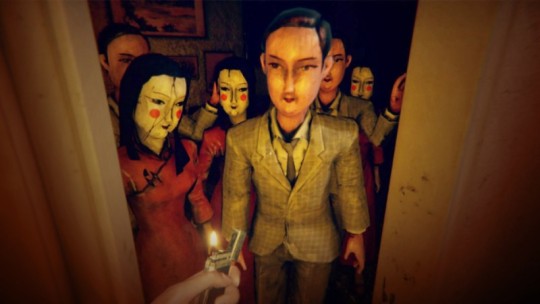
Scaring players has helped put the small team at Red Candle Games on the map. Its first two titles, Detention and Devotion, impressed and terrified fans with frighteningly strong horror chops, but the team is leaving that behind to tackle something completely different in Nine Sols. This side-scrolling action platformer blends sci-fi with Chinese mythology and is Red Candle’s most ambitious project yet. This significant step forward affords an opportunity to look back on the studio’s young history, so we spoke with co-founder Vincent Yang to learn about how a small band of gamers in Taiwan formed one of the industry’s most promising – and, at one time, controversial – indie studios.
Red Candle Games began in 2014 when designer Coffee Yao was developing a prototype for Detention. The side-scrolling horror game features two students exploring a haunted high school in 1960s Taiwan, incorporating local cultural references rarely seen in games. These elements drew the attention of Henry and Light Wang during an indie developer meetup in Taipei. According to Yang, Detention impressed the Wangs enough for them to join the project. As the game grew in scope, the three recruited help from mutual friends – Doy Chiang, Hans Chen, and Yang himself – bumping the yet-to-be-named team to six members by late 2015. After working remotely on Detention for a period, the group decided a physical office was necessary, which led to the official formation of Red Candle Games.
Detention was released on Steam in January 2017 and was well-received by critics and players. The game has since been ported to multiple platforms and even adapted into a live-action film in 2019 (it premiered in the U.S. in 2021). Additionally, Netflix and Taiwan’s Public Television Service released a Detention TV show in 2020 – though with a different story from the movie.

Devotion
Red Candle followed this success with Devotion, an atmospheric first-person horror game set within a haunted apartment. Moving from 2D to 3D development is a big design shift, but Yang believes regularly changing gears like this is necessary to maintain fan interest.
“Because in this ever-changing and competitive gaming market, we often find it difficult to impress the players by applying the same techniques repeatedly, which pushes us to keep delivering new and innovative ideas,” Yang says. “This, in turn, changes the way we make games.”
After over two years of work, Devotion arrived on Steam in February 2019 to heaps of praise from the lucky players who managed to get their hands on it. But only two days after its launch, the game riled up controversy among Chinese players thanks to a piece of in-game art mocking China’s president, Xi Jinping, by calling him Winnie the Pooh, referencing an internet meme that unfavorably compares the leader’s appearance to the character. China and Taiwan have a tense relationship, so the resulting backlash from the country’s players and the government was severe enough to force Red Candle to pull Devotion from sale. The game’s Chinese publisher even lost its business license.

Red Candle Games’ founders, (left to right): Doy Chiang, Hans Chen, Coffee Yao, Vincent Yang, Henry Wang, and Light Wang
To the dismay of horror enthusiasts, Devotion remained delisted for over two years. Inklings of hope would occasionally arise, such as PC storefront GOG announcing plans to re-sell the game before it immediately back-peddled due to vaguely defined player complaints. Fortunately, Red Candle finally began re-selling Devotion directly through its website in March 2021, bringing its tumultuous journey to an end. Red Candle could move forward. “As a team, we felt relieved, as if a heavy weight was lifted from our shoulders,” says Yang.
Moving forward meant stepping away from horror to do something different. Enter Nine Sols, which Red Candle started working on a few months before Devotion’s original launch. Yang says the game originates from a concept he envisioned years prior based on the story of Hou Yi. In Chinese mythology, Hou Yi is a legendary archer who used his bow to rescue the country from plagues and saved the moon during an eclipse, among other supernatural feats. Yang proposed reworking this story into a science fiction tale, an idea that intrigued his teammates.
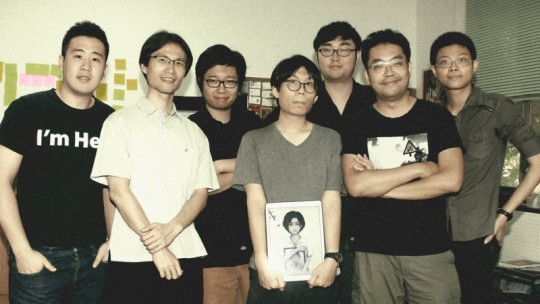
Nine Sols unfolds in the realm of New Kunlun, a sanctuary for humans created by nine god-like rulers. However, the population is unaware of New Kunlun’s sinister true purpose. That changes when a child awakens Yi, a cat-like hero that history has forgotten. Yi embarks on a quest to slay the nine rulers and free New Kunlun. The adventure sports a manga-inspired hand-drawn art direction blending cyberpunk/sci-fi with Chinese fantasy and Taoism. Gameplaywise, Nine Sols is a fast-paced 2D Metroidvania with Souls-like combat, as players hack apart enemies using Yi’s sword and parry attacks in a manner directly influenced by Sekiro: Shadows Die Twice.
The project is a gamble, as the team leaves its comfort zone to make its first action platformer. Yang says with its art assets, gameplay mechanics, levels, animations, and 12-15 hour length, Nine Sols is the studio’s biggest title yet. But the team needed to do something different to avoid feeling burned out on horror while also taking advantage of the flexibility its team size affords.
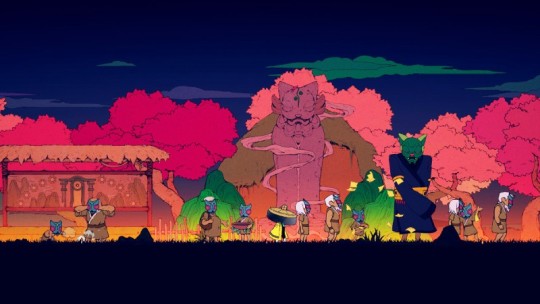
Red Candle Games’ upcoming Nine Sols pays homage to the Chinese myth of Hou Yi, and features a manga-inspired art style
“Being an indie developer, in a way, makes us more versatile and gives us more room to be creative, meaning we have the privilege to experiment on different topics and gameplay,” Yang says. “It’s then reasonable that we want to leverage that versatility and explore other possibilities wherever we have the chance.”
Nine Sols is Red Candle’s first action game, but it’s leveraging its narrative chops to craft what Yang hopes will be a compelling story filled with rich lore to create what he describes as “a new kind of action platformer” – one with equal emphasis on engaging gameplay and storytelling.

Detention
Nine Sols also marks the team’s most serious attempt at penetrating the Western market. Detention and Devotion, despite their success, still appeal to relatively niche audiences. On the other hand, Nine Sols combines two very popular subgenres, and Yang hopes that results in the game making the biggest splash possible overseas and putting the studio on more people’s radars.
Nine Sols is currently slated to launch in Q1 2024, but curious players can play a free Steam demo. Depending on its success, the title could be a launch pad for other experiences that don’t focus exclusively on frightening players.

“If given the opportunity, I think we’d love to explore other genres in the future,” says Yang. “Deep down, we are simply a group of game creators who love all kinds of games. So as long as we ensure the product we produce will have guaranteed quality and doesn’t disappoint our current and future supporters, I find no reasons for us to be locked into the horror genre.”
As for Red Candle’s future, Yang believes maintaining its small size has its benefits. Since Devotion’s launch, only three new employees have joined, while one has left, meaning the studio has grown from 11 to 13 full-time staff members. While he’s happy with the advantages of running a small team – smoother communication and more room to experiment – he’s not opposed to expanding the studio’s size if needed. “I envision us as a resilient team that can embrace and adapts to any possible changes regardless of our size,” Yang says.
Nine Sols is the biggest test yet for the studio, eschewing almost everything that brought it success in an attempt to broaden its appeal by tackling a competitive genre. But Red Candle Games has proven its ability, resiliency, and versatility over its relatively young existence. We’re excited to see how it continues to delight – or terrify – its fans going forward.
This article originally appeared in Issue 356 of Game Informer
#2024#3d#animations#Art#Article#assets#attention#Business#China#coffee#communication#craft#creators#Design#Developer#development#direction#emphasis#employees#Features#Full#Future#game#games#gaming#Government#hack#hand#History#how
4 notes
·
View notes
Text
I'm a huge WFA fan and I can see why people have issues with the entire Batman family of comics but... it's not just that it's fluff. (many limited and even a few potentially ongoing series are fluff and humor, and they sell notoriously poorly)
webtoons are free. that's the biggest one. you can't compare 'sales' of a free thing to something that costs money, and especially not something that, at this point, costs kind of a lot of money compared to most people's fun money
webtoons are weekly. it's a lot easier to remember something that happens weekly than something that happens once a month, and most people aren't buying enough comics for that to become consistently weekly, or they're subscribing to services (or pirating) in a way that isn't time bound in the same way. something that happens the same day every week is easier
they're shorter, more standalone, and formatted to scroll through on phones (and it's harder to read comics on a phone than a physical copy, and awkward on a computer). most people use their phones for most of their media, and even people who don't have the phone if they want to take a quick break and look at a short story that's up there. you don't have to read all of them and you don't have to read them in order (except for a few multi-part stories) and it's not as much of a time commitment. but it's still easy to read many in a row without getting bogged down in details or having to cross-reference anything
WFA is an isolated story. not only is there no required background reading (altho there's lots that can be gotten out of it if you do have that background) there's also no crossovers or extensive references that expect you to have been following other stories, sometimes lots of other stories
consistency. there's only one team, which means there's a standardized art style with continuous character references, and the writing style is maintained in the same way. so if you like it you'll generally like all of it. comics can't keep the same artist across multiple titles, and shouldn't keep the same writer. but even within a single title, the B story can be extremely different in tone, scope, topic, etc. than the A story. and switching between stories quickly can give a reader whiplash, wondering why last month's ended so abruptly and this month's is something completely unrelated in a totally different register
WFA is also marketed towards women/in feminine social contexts, because way more women than men read webcomics. so they pick attitudes and topics considered more traditionally feminine, because comics are thought of as a masculine pastime. only the thing is women are actually a larger portion of the readership than men for literally everything, because women just read way more than men do, for a few decades now. also, regardless of market share and targeted advertising... having used the webtoon app, the way they advertise based on reading history and subscriptions makes perfect sense and is easy to use. the way that DC markets its comics is. not
circulation is also a huge one. it's way easier to share a single funny panel out of context than a single deeply emotional one. and while humor writers still tend to understand that you need more serious moments to keep the humor fresh, it's increasingly harder to convince people that serious things need the occasional comic relief for the emotional impact to really hit. this is a problem with art reception but it's way more complicated than the topics people do or don't like to see.
what I'm saying is if you made something free, weekly, standalone, starting at the beginning, with a talented and consistent writing and art team, dealing with issues they actually understood and that spoke to their audience, with large dramatic no dialogue panels that were simply beautiful and poignant to look at interspersed through the story, with characters who were already world famous and popular, it would also have a huge audience. angst/drama can absolutely be done that way, and is the reason that soap operas have remained such an appealing form to such a large audience.
plenty of people who are perfectly nice and fun people prefer angst over fluff. plenty of people like angst and fluff equally. plenty of people can't stand too much of one if they don't get any of the other and need to maintain a balance between them. it doesn't say anything about the majority of the audience or who wants what out of which fiction. you're going apple picking and pointing to everyone's apples and asserting that clearly people never liked oranges in the first place.
3 notes
·
View notes
Text
AFAIK the light novel titles are only like that because *web* novel titles are. With a physical book, you have a whole front cover, advice from editors etc, and perhaps some small amount of marketing budget to get people interested in your book. With webnovel hosting sites, you have one line to sell your story, and titles are their own art -- anyone who's seen enough fanfic titles knows how bad amateurs tend to be at that -- if you don't know what you're doing, just saying "This Is Why You Should Read My Book: The Book" is a lame but effective compromise.
But the webnovel industry in Japan is pretty big, and they often get adapted into light novels, that, if they sell well enough, often get adapted into manga, which often get adapted into anime in turn . . . Keeping the longass titles or the contractions of them.
That might not even be the origin though, arguably, as Japan seems to have a thing for highly descriptive names when translating foreign movies too (I don't know enough to say if Japan also has a tendency to do this with Japanese original works as well) eg, "Despicable Me" is "Mysterious Theif Gru's Moon Theft 3D", "Up" is "Grandpa Carl's Flying House", etc. Whether this is part of the same, older trend in Japanese titles I can't say, but it's worth considering.

104K notes
·
View notes
Text
Big Wolf Band - Rebel's Journey
Release Date: 19 Apr 2024

Hailed by music pundits as most highly anticipated album collection of songs of their career, "Rebel’s Journey" is Big Wolf Band’s second instalment of the Rebel’s trilogy of albums. The new album is about the growth of the band and frontman’s Jonathan Earp’s personal journey.
Big Wolf Band have built a reputation as being one of the best live bands on the circuit, delivering dynamic shows with an expansive range of self-penned songs that cover all flavours of blues rock that truly makes them unique. Rebel’s Journey reinforces this bands creativity, musicianship, and delivery. Each song having its own identity but still that unmistakable Big Wolf sound. The band’s ability to drift between genres while keeping their own sound is a big selling point amongst followers of the band.
Vocalist and guitarist Jonathan Earp says, “Rebel’s Journey highlights my own personal battle with my mental and physical health. I have a connective tissue disorder called Ehlers-Danlos Syndrome (HEDS) which affects everything. I had surgery in mid-2019 during our 'Be Free' tour to repair damage to my right shoulder, dislocations, and nerve pain. Unfortunately, the operation caused more pain and numbness and for nearly 2 years I struggled to play, some days to even hold a plectrum."
"Songs like 'Standing in the Rain', 'Black Dog Blues', and 'Living on Borrowed Time' are about the battles I had during those dark days. My condition will always be a challenge but one I live with and continue to prove doubters wrong.
"The album isn’t all doom and gloom, despite being in the blues genre. 'Empire and a Prayer', my first co-written song with Justin Johnson, as well as 'Got Me Reeling' and 'Living on Borrowed Time'. We have had many a joke with my dark writing style, Justin brings the light and love. 'Rise Together' is one of the songs on the album I am proud of and is all about the power of love, rising together and that anything is possible.”
Big Wolf Band were recently nominated for “UK Blues Band of the Year” at the 2024 UK Blues Awards.
2024 Tour Dates 29 Mar - The Bear, Luton 31 Mar - Nantwich Jazz and Blues 5 Apr – Temperance Leamington Spa. 12 Apr - Arlington Arts Centre, Newbury 14 Apr - Bromley Blues Club 20 Apr - Blues at the Barleylands, Billericay 21 Apr - Hope Tavern, Market Rasen 26 Apr - Bosworth Blues Festival 11 May - Macclesfield Beer Festival 24 May - Saltburn Blues Club, Redcar 25 May - Booze and Blues Leicester. 7 Jun - Lamp Tavern, Dudley 13 Jun - Red Arrow Music Club, Ramsgate 16 Jun - Blues Weekend at the Toorak Hotel 23 Jun - Bluefunk Rhythm and Blues Club, Poynton (double Header with CBO) 5 Jul – Alfold Rock and Blues Festival, Alfold 9 Aug – Darlington R&B Club 16 Aug Warrington Blues Club 17 Aug - Old Bush Blues Festival 23 Aug Colne R&B Festival 24 Aug – Rory Gallagher Festival, Nantwich 25 Aug - Congleton Jazz and Blues 6 Sep - Nene Valley Festival 15 Sep - Red Lion, Stevenage 20 Sep - Joe Joe Jim’s Birmingham 4 Oct - Backstage at the Green – Kinross 5 Oct - Calendar Jazz & Blues 12 Oct – Boat shack, Upton Warren 1 Nov - Colne Delta Blues and Americana Club 23 Nov - Giffard Arms, Wolverhampton 13 Dec - Emsworth Music Club
0 notes
Text
Lecture Notes MON 11th DEC
Masterlist
BUY ME A COFFEE
Doing Art History: Performance Art
Installation artwork – archival/ is not the same as performance art.
In 1916 the Cabaret Voltaire was established as a department in Zurich to protest and reject art as an aesthetic and the art market. During the war Switzerland, where this department was set up, stayed neutral. Especially European art centres rejected privatisation of art.
The whole idea of performance art was to in some way reject the commodification of artworks, removing the aspect of a forever piece.
Performance art became a combination and experimental fusion of all arts, focusing on the experience rather than the physical outcome and commodification of it.
Artists became hostile with their art, in turn being provocative.
Here is an example of a performance art before we had the ability to record it:

Hugo Ball in 'cubist costume' reciting his poem 'Elefantenkarawane' at the Cabaret Voltaire, 23 June 1916.
And now here is a recreation of that performance piece, recorded:
youtube
Another example of performance art from around that time:

Pablo Picasso/ Character from Parade by Jean Cocteau and Eric Satie, Decor and Costumes by Pablo Picasso, Paris, Mai/ May 1917
youtube
After and during World War 1, there came a rejection of the world. Rather than the typical transcendence attitude within art and the world, we began a bitter depression.
From this came Dada, named so as a nonsense word, self-made by artists. To be satirical and nonsensical in nature. These artists even produced a manifesto to capture all their beliefs of the time. As well as a journal was created to present new artists performance pieces.
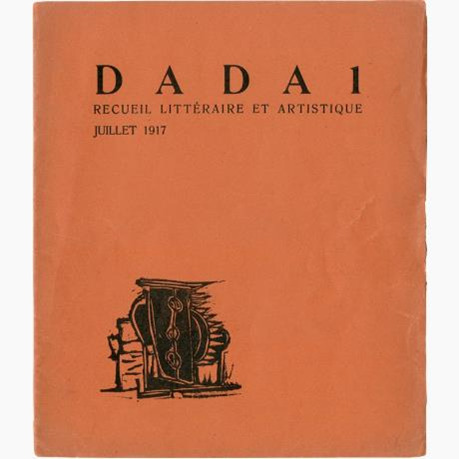
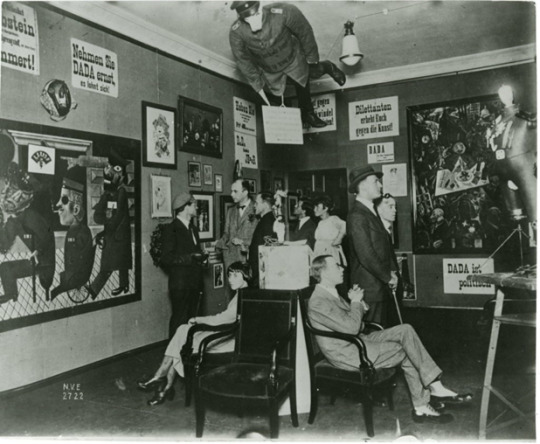
Dada journal, Zurich, July 1917 International Dada Fair, Berlin, 1920
Since performance art was something, you couldn’t exactly sell, a lot of these artists made their money elsewhere or were broke. One such artist, that art history has only in recent times began to name and explore is Elsa von Freytag-Loringhoven. Penniless all her life as she made her entire life a performance of the Dada movements. She died incredibly young in the 1920’s, most likely due to her poor living circumstances and conditions. And the reason for a very poor documentation of her life and history, comes from the fact she has no dedicated friend or partner to display her or publish her. A lack of network made her fall into the recesses of history.
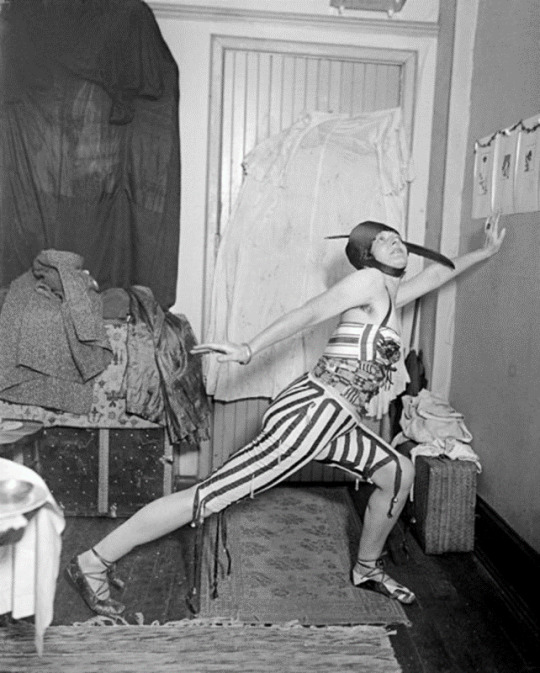
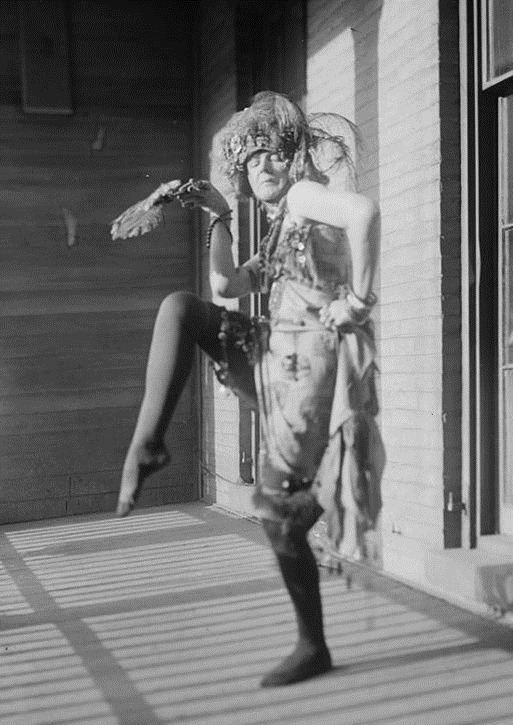

Elsa von Freytag-Loringhoven, Performance artist, New York 1915 Elsa von Freytag-Loringhoven, Performance, c.1920 Man Ray, Photo of Elsa von Freytag-Loringhoven (c.1921) University of Maryland
The canon of Art History is one that is re-written and added to constantly, the bare bones basic skeleton of knowledge is abandoned in teaching due to exploring and looking outside of what is already known, there is a greater encouragement placed on adding personal beliefs into the history and perspectives. Rediscovery of art and artist is continuous.
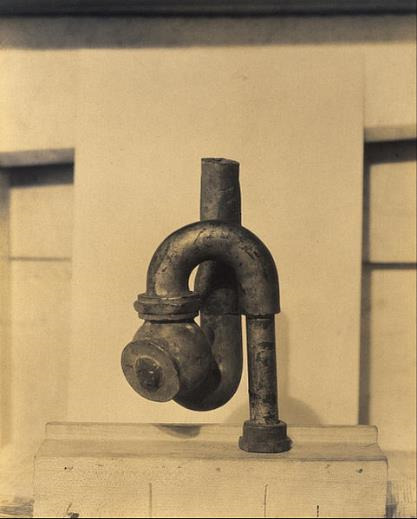

Elsa von Freytag-Loringhoven, God, 1917 Philadelphia Museum of Art The original Fountain by Marcel Duchamp (?) photographed by Alfred Stieglitz at the 291 (Art Gallery), 1917
Elsa von Freytag-Loringhoven is being considered as a revolutionist artist due to her creating a similar example out of this pipe. Titling the work ‘God’, which if you looked at my previous lecture, you’ll see a similar artwork, the Fountain by Mr. Mutt. Who came first is hard to say, but it is clear one was more prominent and recognised, while the other is still not as widely known as it perhaps should be. Does it matter who came first?
As it still makes up the movement and the area of art in history. Who had the idea first? Does that matter?
Every mark on an artwork is a mark of the artists presence, but that usually gets overshadowed. However, performance art solely focuses on the artists presence. The artwork is them.
Dada movement liked making ‘ugly’ art, it was to combat the commodification, the market, which is paradoxical as the art market is how artists survive.
Other examples of Performance Art:




(Top Left) Tracey Emin, My Bed, 1998. Mixed media (Top Right) John Lennon and Yoko Ono, Bed-in for Peace, Amsterdam. 1969 (Bottom Left) Richard Long, A Line Made by Walking (Tate Britain, 1967) (Bottom Right) Carolee Schneemann, Interior Scroll, 1975
E.H. Gombrich who wrote ‘The story of art’, didn’t mention women until the 12th edition of the book.
“...the story of artists can only be told when it has become clear, after a certain lapse of time, what influenced their work had on others and what contributions they have made the story of art as such. Thus, I tried to select from the mass of buildings, sculptures and paintings still mentor us after thousands of years, a very small number that could figure in the story that dealt first and foremost with the solution of certain artistic problems, solutions, that is, that determined the course of future developments. The nearer we come to our own time, the harder it inevitably becomes to distinguish passing fashions from lasting achievements.” E. H.Gombrich, The Story of Art, [1950, revised multiple times, 15th edition], Phaidon, reprint 1995, pp.600
However, his book is constantly revised and revisited due to the thinking surrounding Art changing, with artists falling in and out of favour. How do you tell the story of Art History?
A current argument being discussed and debated within Art History is decolonisation, Decolonial/Postcolonial.
POSTCOLONIAL ART: Postcolonial art refers to art produced in response to the aftermath of colonial rule, frequently addressing issues of national and cultural identity, race and ethnicity. Postcolonial theory, which underpins postcolonial art, does not simply relate to the time after which a nation gains independence from its colonial ruler. It analyses and responds to the cultural legacies of colonialism and the human consequences of controlling a country in order to exploit the native people and their land. In doing this it also addresses how the society and culture of non-European peoples were seen from the perspective of Western cultural knowledge; how this was used to subjugate people into a colony of the European Mother Country; and the resulting identities of ‘coloniser’ and ‘colonised’. Martinique-born intellectual Frantz Fanon was one of the leading anti-colonial thinkers of the twentieth century, and provided a theoretical framework for interpreting the oppression of the individual under imperialism – a significant element of much postcolonial art. An important influence on Fanon’s ideas was his teacher and mentor Aimé Césaire one of the leaders of the Négritude movement. In books such as Wretched of the Earth first published in 1961, Fanon analysed the effects of colonialism and decolonization and the role of class, race, national culture and violence in the struggle for national liberation. This and other books initiated the investigation of diversity and hierarchy in postcolonial cultures undertaken by writers such as Edward Said, Stuart Hall and Homi Bhabha. -Tate
https://www.tate.org.uk/art/artterms/p/postcolonial-art
Click Here for more voices on Decolonial/Postcolonial.
Here are some artworks of colonial art:
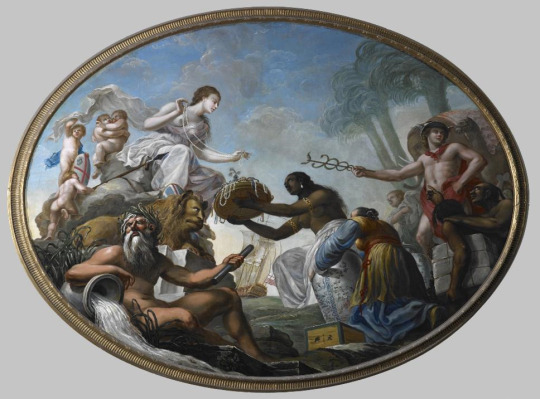

(Left) ‘The East offering its riches to Britannia,’ Allegorical ceiling piece commissioned by the East India Company for the Revenue Committee Room in East India House, 1777. Shelf Mark: Foster 245: 1778. Copyright British Library Board. (Right) Pierre Mignard, Louise de Kéroualle, Duchess of Portsmouth with an unknown female attendant, (NPG, 1682)
It wasn’t until recent that this artwork was renamed to address the person of colour in this painting. There is literally no way to know everything about Art History as the subject becomes more and more accessible and more and more voices and perspectives come to light.
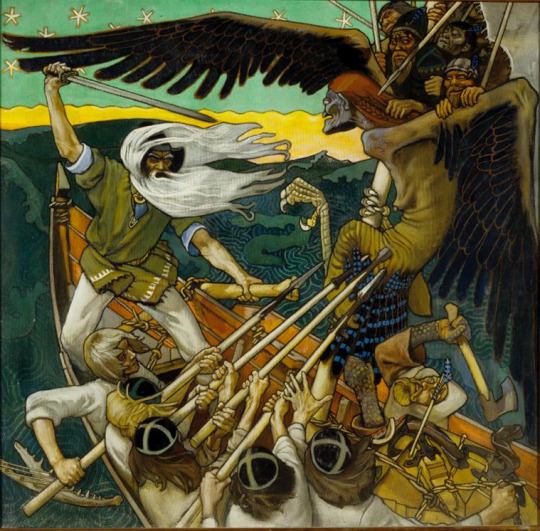
Akseli Gallen-Kallela, Defence of the Sampo, tempera on canvas(1897)
This work is comparable to that of Japanese prints and borrows from the style, however the artist is Finish.
Why can European artists borrow from other countries/minorities – and not the other way around?
Here is an example of a work by an Indian artist, borrowing from the impressionists (I may be wrong about that specific), but they borrow from European art in this piece.
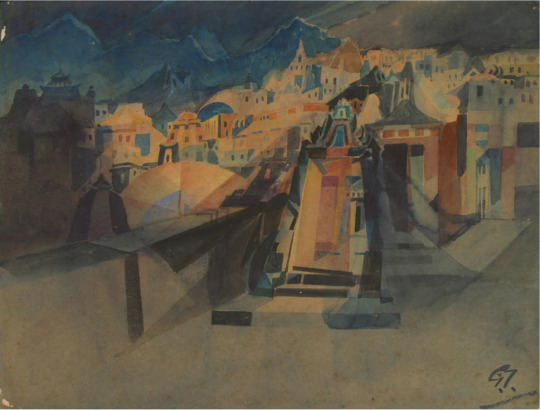
Gaganendranath Tagore, Dwarkapuri, Victoria Memorial Hall, Kolkata. Watercolour 12" x 9“ - undated
#Youtube#artwork#art gallery#art#architecture#artists on tumblr#art hitory#illustration#watercolor#art tag#digital art#history#historical#art history#dark academia#light academia#chaotic academia#poetry#politics#portrait#essay writing#essay#in this essay i will#video essay#personal essay#writers#creative writing#writing#writers on tumblr#writeblr
14 notes
·
View notes